Swiss Travel Pass vs Half Fare Card: Which one should you choose?
Some links in this post are affiliate links, which means I earn a small commission if you book through them, at no extra cost to you. This support helps keep this site running, the suitcase wheels spinning, and lets me keep writing ultra-detailed travel guides that are free for you to use to plan your next adventure.
If you’re planning a Switzerland trip, the age old dilemma of the Swiss Travel Pass vs Half Fare Card is something every traveller has to consider. Read on to get a better idea of which Switzerland travel pass is best for you.
If you want to experience Switzerland’s magic without having a financial panic attack, travel passes like the Swiss Travel Pass or Swiss Half Fare Card are going to save the day. The tricky part is figuring out which pass is going to leave you the most Swiss francs to spend on fondue and chocolate.
Never fear, your resident travel nerd is here 🤓 (seriously though, I don’t think there’s anyone in the world with more travel spreadsheets than me).
I’ve spent loads of time exploring Switzerland’s cities and scenery by train, boat and bus, and I’ve compared the Swiss Travel Pass vs Half Fare Card for loads of itineraries to find which one gives you the best bang for your buck.
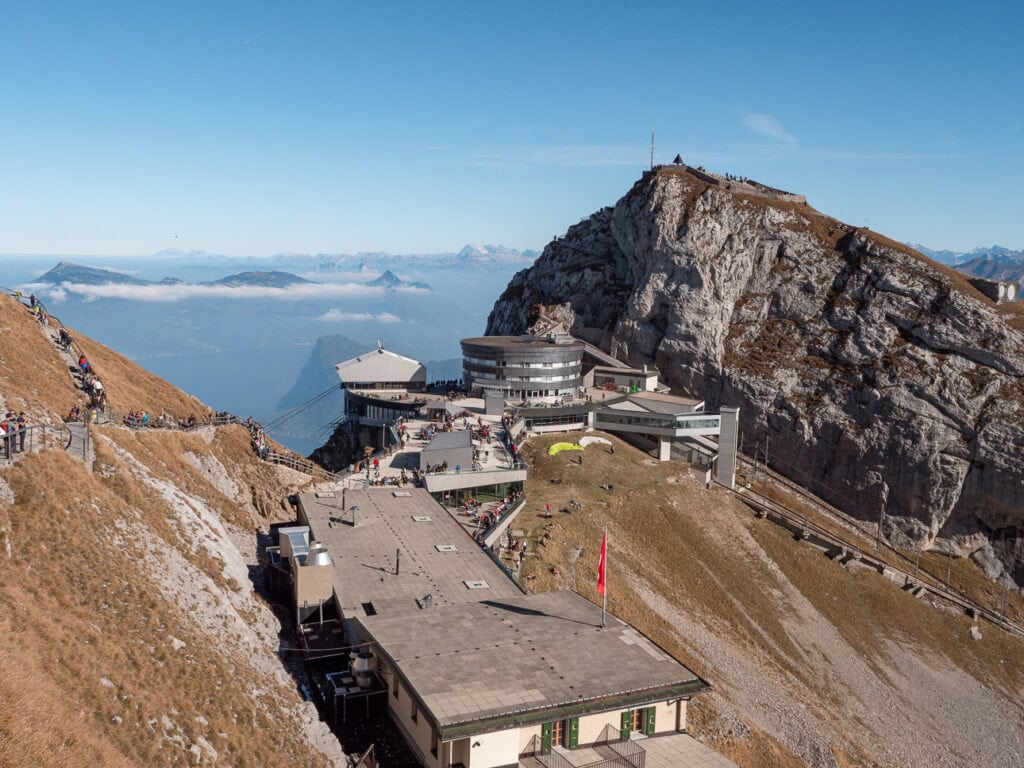
While the annoying answer to the Swiss Travel Pass or Half Fare Card dilemma really is “it depends”, there are a few key indicators that will show you one pass is better than the other for your itinerary.
In this blog post I’ve shared those helpful indicators that will nudge you in one direction, all you need to know about the two passes and what they include/don’t include, pros and cons of both passes, pricing details, helpful example itineraries to give you a proper budget breakdown, and finally some alternatives to the STP and HFC.
And if you have any further questions, feel free to pop a comment at the bottom of the blog post and I’ll try and get back to you as soon as I can!
P.S. If you book your Swiss Travel Pass or Swiss Half Fare Card through the links in this post, you can save 10% using the promocode FINDINGALEXXKLOOK.
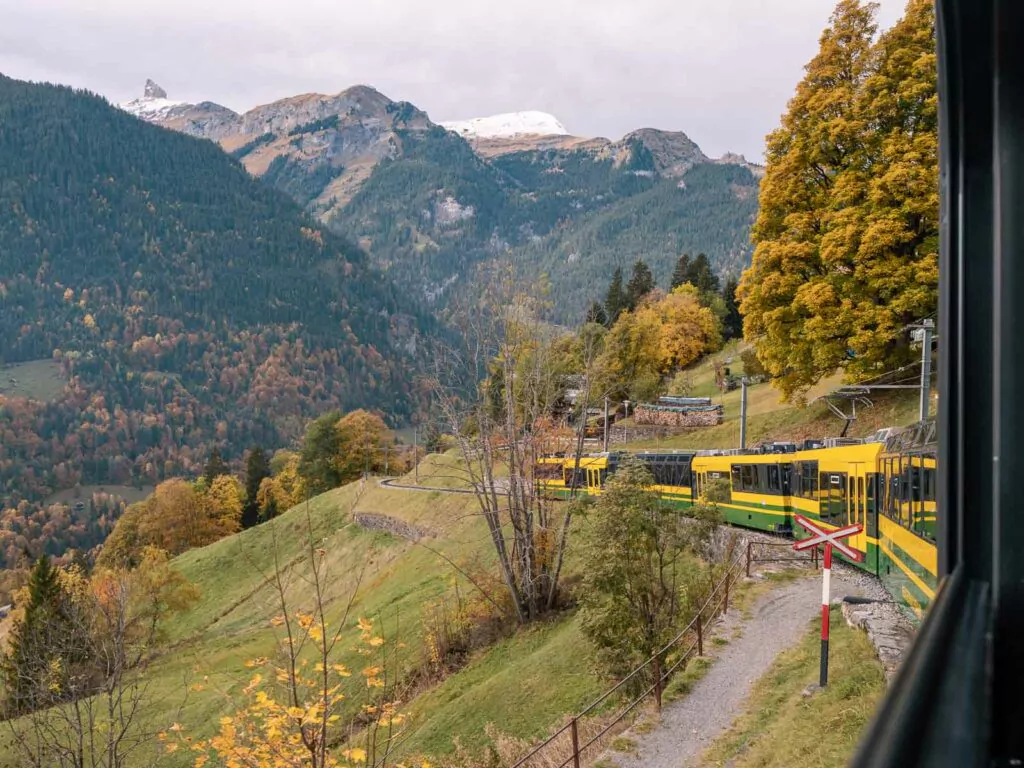
Quick summary: Swiss Travel Pass vs Half Fare Card
If you can’t be bothered reading a detailed guide and just want to know whether the Swiss Travel Pass or Half Fare Card is better, here you go.
When to choose the Swiss Travel Pass
The Swiss Travel Pass is significantly more expensive upfront but gives you much more flexibility and freedom, as there’s no need to buy tickets on public transport and most inter-city trips. You will need to pay for most mountain excursions though, and the discount is usually the same or worse than the Half Fare Card.
✅ The Swiss Travel Pass is great if:
- Budget isn’t a concern and you’d prefer to pay a bit more for flexibility and convenience
- You’re planning on taking the expensive panorama trains like the Glacier Express or Bernina Express
- You’re doing the full Grand Train Tour of Switzerland
- You aren’t planning on doing too many mountain excursions
- You plan on visiting loads of museums
- You’re booking your trip quite last minute, within a few days of travel
When to choose the Swiss Half Fare Card
Travelling with a Swiss Half Fare Card actually often ends up being cheaper overall than the Swiss Travel Pass (as you can see in the itineraries below), but the compromise is that you have to buy tickets for every trip so it can take a bit more planning, and can cost more when booking last minute vs. booking far in advance.
✅ The Swiss Half Fare Card is great if:
- You’re planning on doing lots of mountain excursions
- Saving money is more important than convenience and flexibility
- You’re in Switzerland for longer than 1.5-2 weeks
- You know your itinerary in advance and can book in your transport early
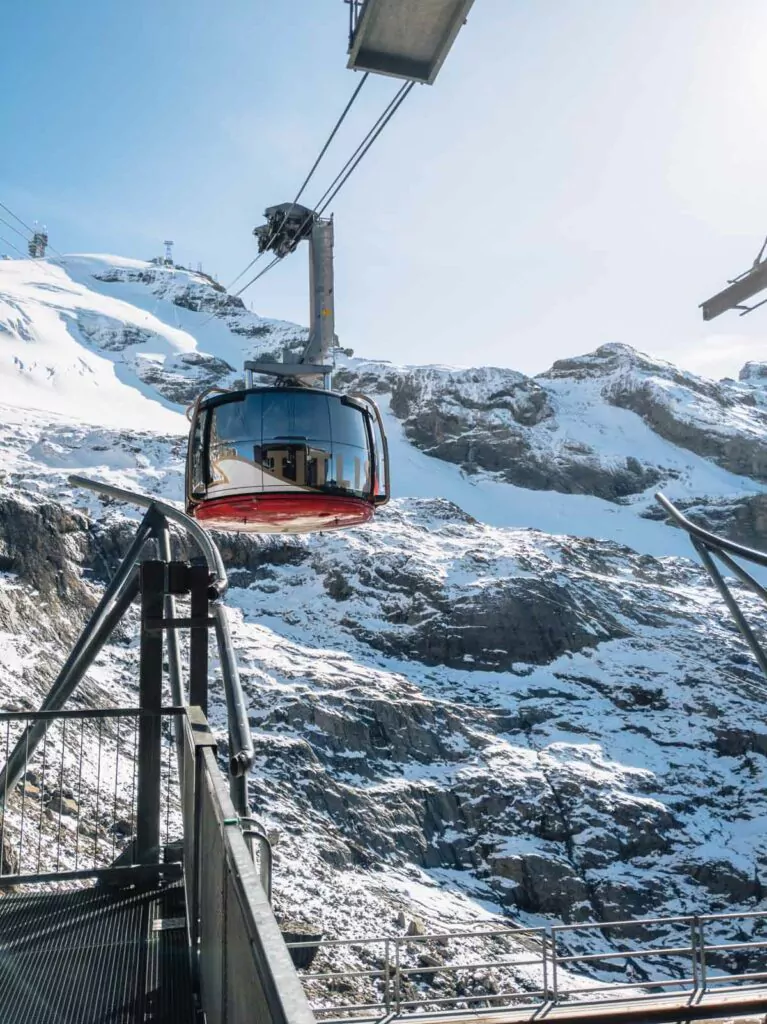
How to calculate the best Switzerland travel pass for your trip
If you want to know the exact value that each pass could give you, you’ll need to calculate it in a spreadsheet.
You’ll want three columns:
- Normal full fare price without a pass
- Price with a Half Fare Card
- Price with Swiss Travel Pass
Then you’ll want a row for each journey, plus a row to add the cost of the Half Fare Card and relevant Swiss Travel Pass.
Then all you need to do is add up each column, and you’ll find the total price you’ll pay for your trip with the different cards.
Confused? No stress, I’ve got examples of my calculations below so you can see what I mean.
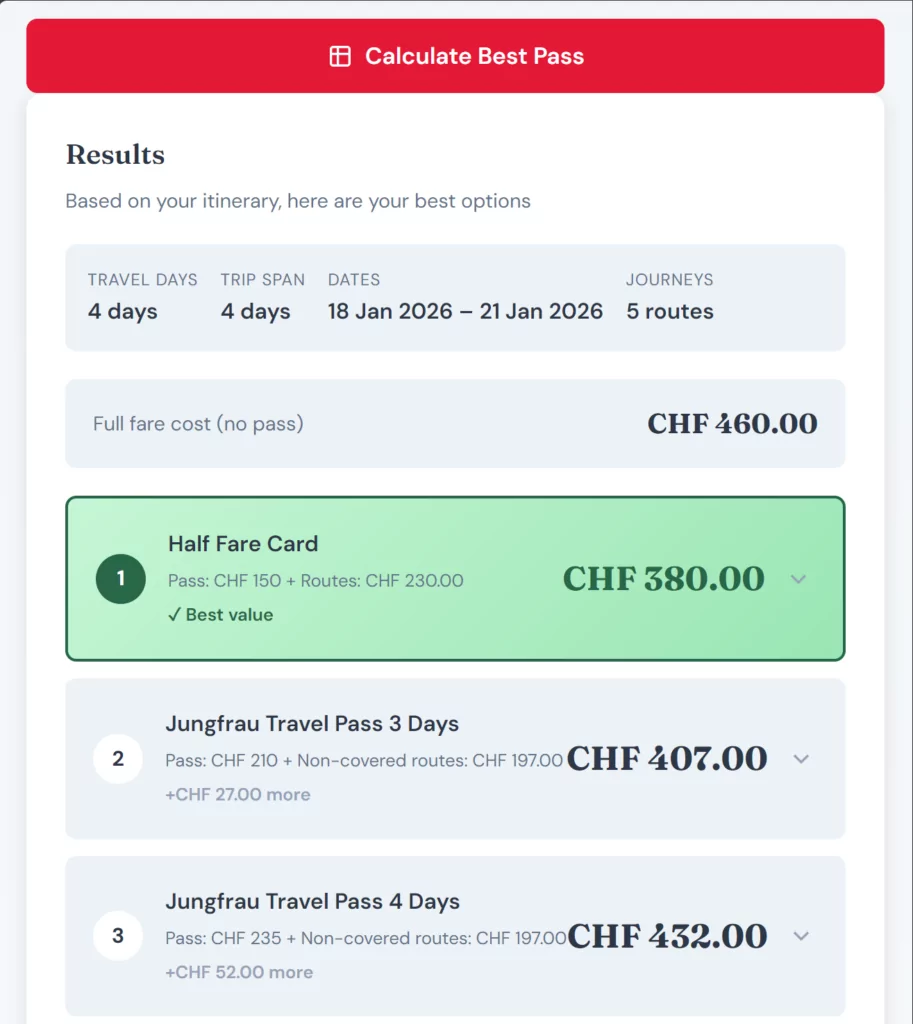
Sick of spreadsheets?
Swiss Travel Pass Calculator coming soon!
I’m building a free Switzerland travel pass calculator to tell you exactly which pass is best for your itinerary.
Join the waitlist to get first access ⬇️
If you’d like me to take a look at your exact itinerary and let you know which option is best, I offer Switzerland travel pass consultations to make it super easy for you, with pricing dependent on length of the itinerary. Email me at [email protected] with ‘Switzerland travel pass consultation’ in the subject line and I’ll send you through all the details 🥰
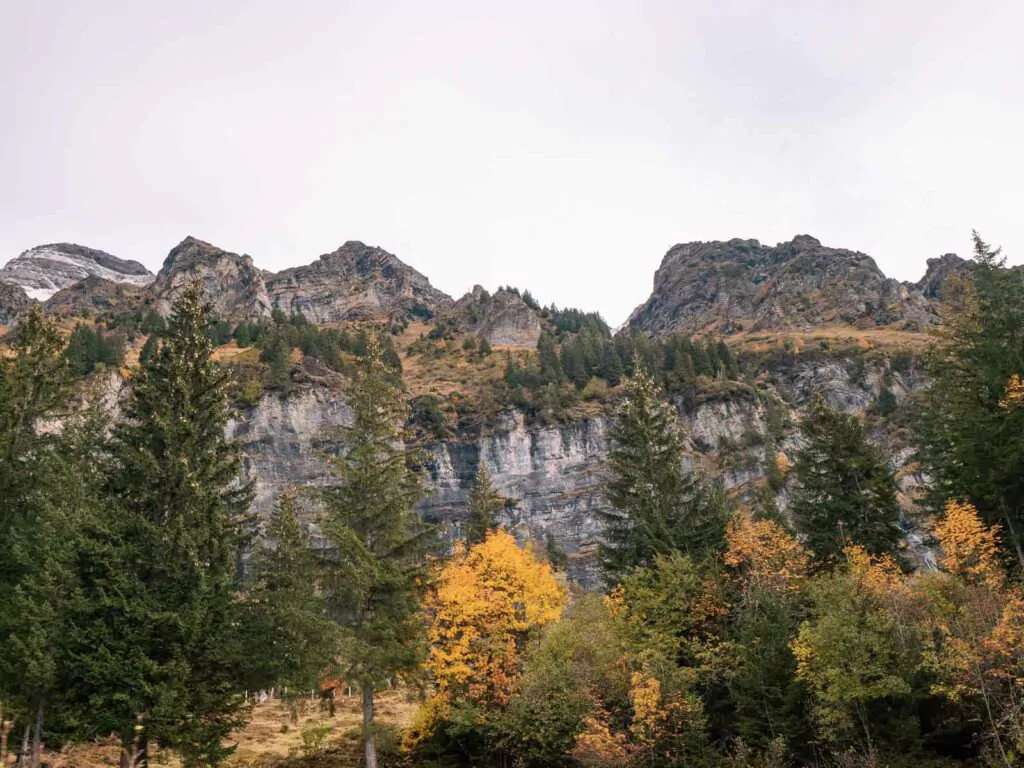
Why do you need a travel pass for Switzerland?
Switzerland is home to a number of the most beautiful train journeys in Europe, but have you seen those prices?! This place isn’t cheap, and getting from A to B + going on mountain excursions uses up a pretty decent chunk of your travel budget.
With a travel pass though you can end up saving loads of money.
Both the Swiss Travel Pass and the Half Fare Card will end up being cheaper than buying individual full fare tickets for *most* Switzerland itineraries, but which one to choose will depend on your specific route and your preference for value vs. convenience.
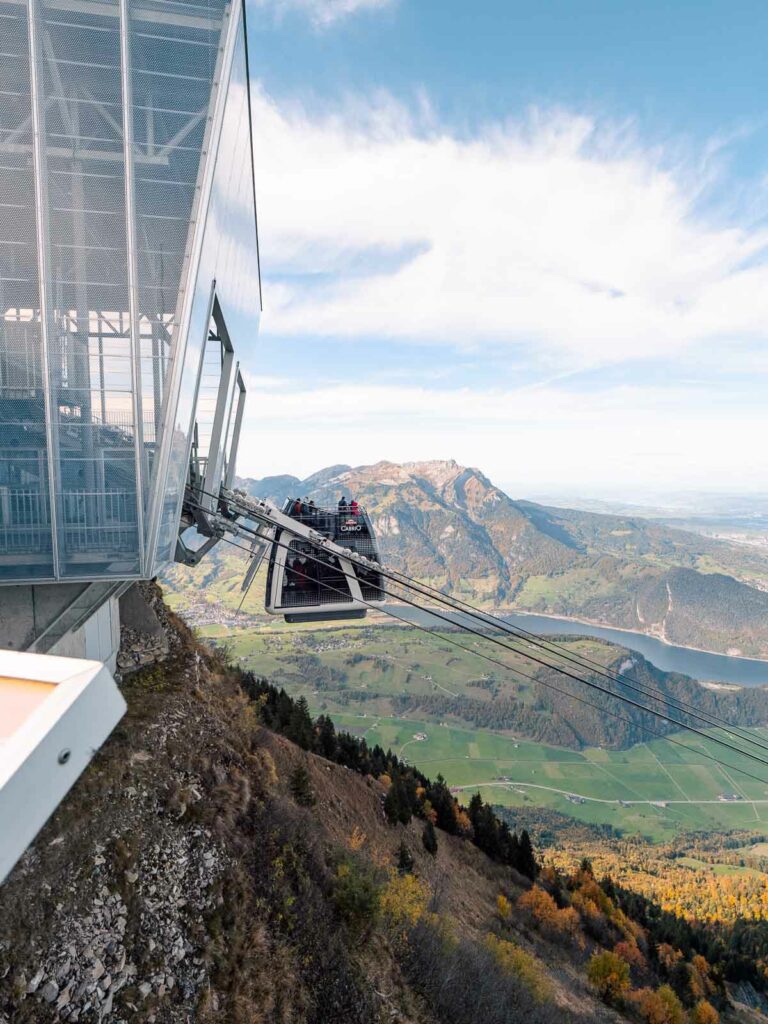
Swiss Travel Pass vs Half Fare Card overview
Let me explain all you need to know about the different passes we’re comparing, the Swiss Half Fare Card and the Swiss Travel Pass.
All about the Swiss Travel Pass
What is the Swiss Travel Pass?
An all-in-one ticket that lets you travel freely across Switzerland’s extensive network of trains, buses and boats, as well as providing free access to loads of museums and discounted rates (usually 50%, some 25%) on mountain excursions and cable cars.
How long is the Swiss Travel Pass for?
The Swiss Travel Pass is available in two formats:
- Consecutive pass (cheaper): 3, 4, 6, 8 or 15 days of unlimited travel, from your start date you have free reign for the relevant number of days
- Swiss Travel Pass Flex (more expensive, non-consecutive): Offers the same benefits but your travel days can be spread out over a month. Choose a 3, 4, 6, 8 or 15 day Flex pass and ‘activate’ it on the days you want to use the pass.
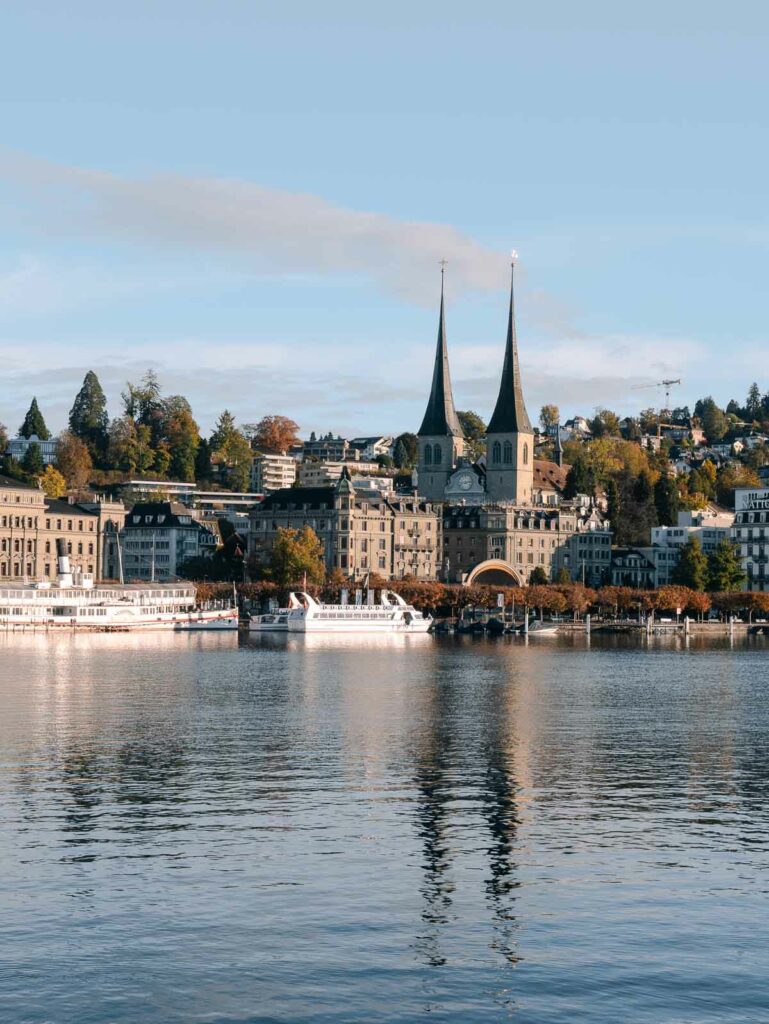
What is included in the Swiss Travel Pass?
- Unlimited travel on trains, boats and buses on the Swiss Travel System network
- Panoramic trains like the Glacier Express and Bernina Express
- Access to Rigi and Stanserhorn mountains for free
- 50% discount on most other mountain railways and cable cars
- 25% off the connecting ticket to Jungfraujoch (you get free travel until Grindelwald/Wengen)
- Free public transport within 90 cities
- Free entry to more than 500 museums
What isn’t included in the Swiss Travel Pass?
- Seat reservations for panoramic trains (this is always additional to any travel/rail pass)
- The mountain excursion to Jungfraujoch (just 25% off)
- Mountain excursions and cable cars like Gornergratbahn, Matterhorn Glacier Paradise, Titlis or Pilatus (50% off most of these)
- Private lake cruises (but regular, scheduled boat trips on the public transportation network are included)
- Adventure activities on mountains like the zipline at Grindelwald-First
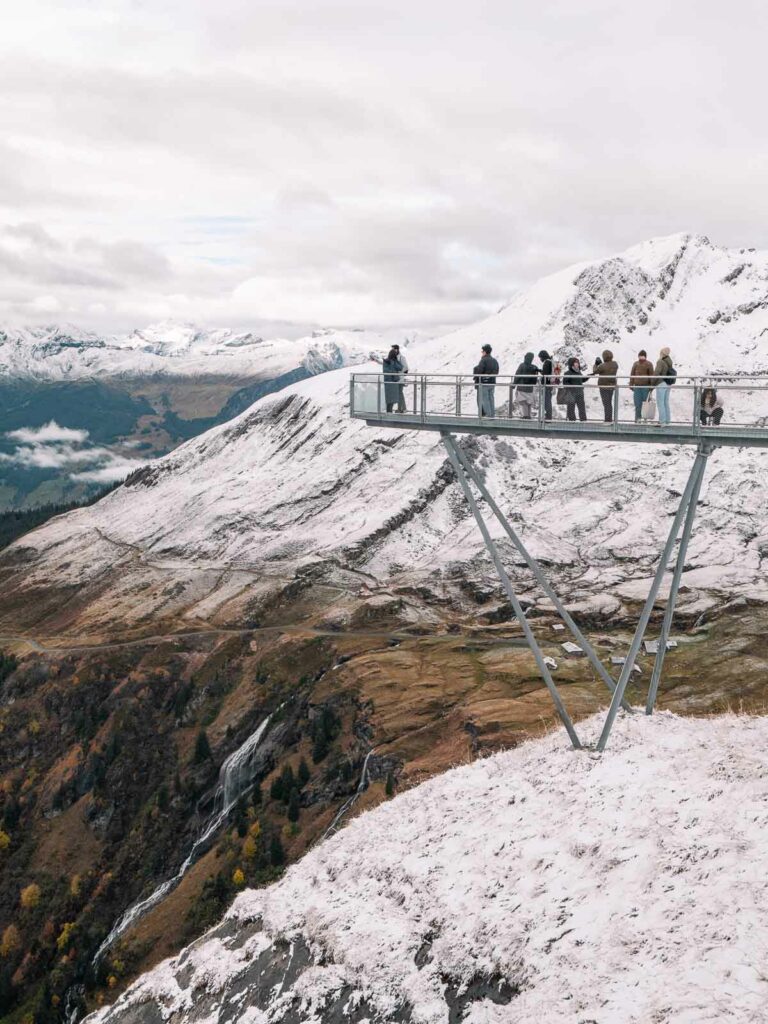
All about the Swiss Half Fare Card
What is the Swiss Half Fare Card?
A travel card designed for visitors to Switzerland that allows them to save 50% on trains, buses and boats across the Swiss Travel System network, plus 50% off most mountain railways and cable cars.
How long is the Swiss Half Fare Card for?
The Swiss Half Fare Card is valid for one month.
What is included in the Swiss Half Fare Card?
- 50% off train, bus and boat travel within the Swiss Travel System network.
- 50% off most mountain railways and cable cars (including iconic ones like Jungfraujoch, Pilatus, Titlis, Gornergratbahn and Rigi Kulm)
- 50% off public transport in over 90 cities and towns across Switzerland
- 50% off the ticket price for panoramic trains (Glacier Express, Bernina Express, etc.)
- Access to discounted rates on regional travel cards like the Jungfrau Travel Pass or Berner Oberland Pass
What isn’t included in the Swiss Half Fare Card?
- Seat reservations on some panoramic trains, these still need to be purchased at full price even with the Half Fare Card
- Some smaller mountain railways or cable cars may offer smaller discounts or no discount at all
- Adventure packages on mountain excursions like Grindelwald-First, you can get a discount for the transportation element but not for any activities
- No museums are included in the Half Fare Card
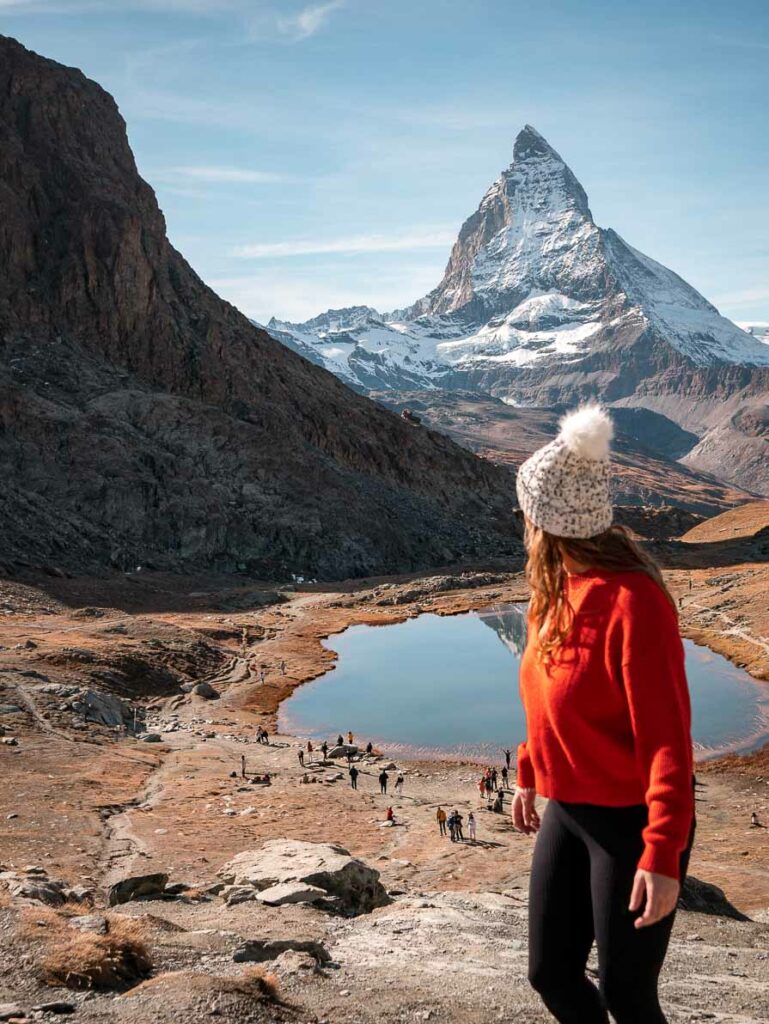
Pros & cons of the Swiss Travel Pass vs Half Fare Card
Swiss Travel Pass pros
✅ Convenience: Jump on most trains, boats and buses freely without buying separate tickets
✅ Free panoramic trains: Covers full cost of expensive routes like the Glacier Express and Bernina Express (seat reservation not included though)
✅ A couple of free mountain excursions: Travel to Rigi Kulm and Stanserhorn are fully covered
✅ 50% off most other mountain excursions
✅ Museum access: Free entry to more than 500 museums across Switzerland
✅ Flexibility: Choose consecutive days for a daily travel (cheaper) or a Flex pass to spread out your usage over a longer trip
Swiss Travel Pass cons
👎🏼 It’s pricey: Significantly more expensive upfront than the Half Fare Card
👎🏼 Limited mountain discounts: Most mountain railways and cable cars give you the same discount as the HFC
👎🏼 Lower Jungfraujoch discount: Only 25% Jungfrau, compared to 50% off with the HFC
👎🏼 Potential wasted value: Can be less cost-effective if you don’t utilise all the travel days wisely
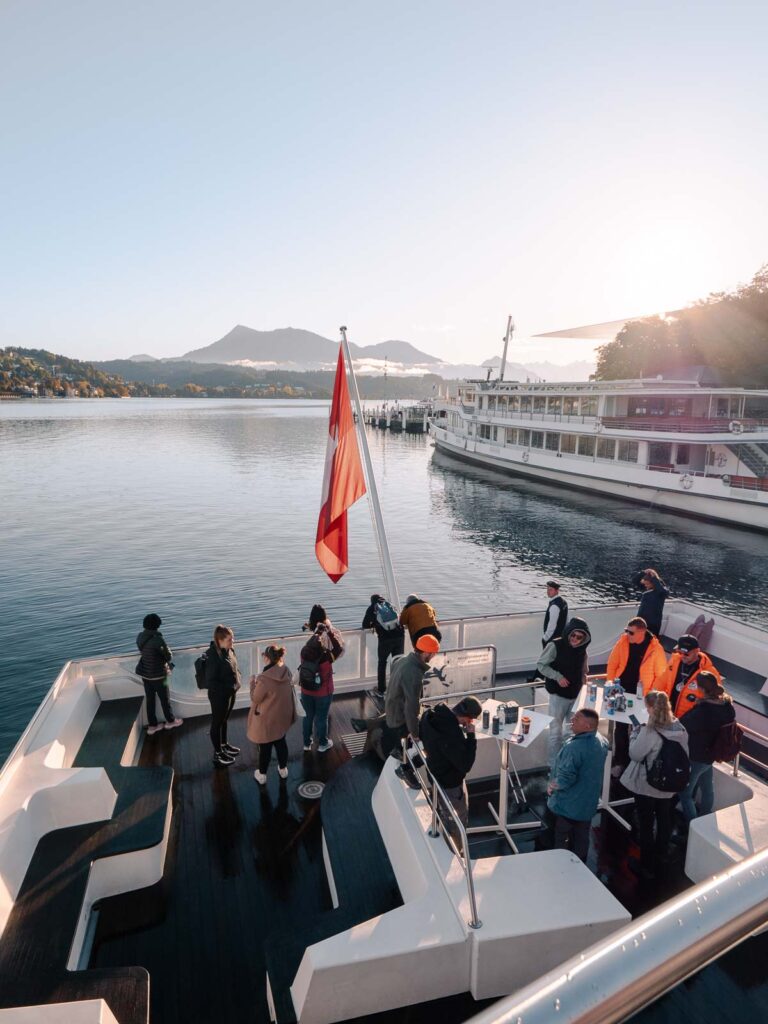
Who is the Swiss Travel Pass best for?
- Short trips with lots of travel: If you’re squeezing in a lot of destinations (and especially mountain excursions) in a 3-8 day period, the convenience of not buying individual tickets or having total flexibility can outweigh the cost
- Panoramic train enthusiasts: If taking the Glacier Express, Bernina Express or similar trains is a priority, the STP covers the entire ticket cost (you just pay the reservation fee)
- Grand Train Tour travellers: If you want to go all out with the panorama trains and do the famous Grand Train Tour, the Swiss Travel Pass is probably going to save you the most CHF
- Museum lovers: If you plan to visit multiple museums, the free admission with the STP adds a bit of extra value
- Those who value ultimate convenience: If the idea of planning train times and buying tickets for each leg stresses you out, the STP lets you hop on and off as you please
- Families or big groups: It would be particularly easy for a group of travellers to use the Swiss Travel Pass just to reduce the admin time involved with booking specific tickets and being less flexible. That way if someone’s running late you can just jump on the next train instead of having to waste tickets and get everyone to pay again!
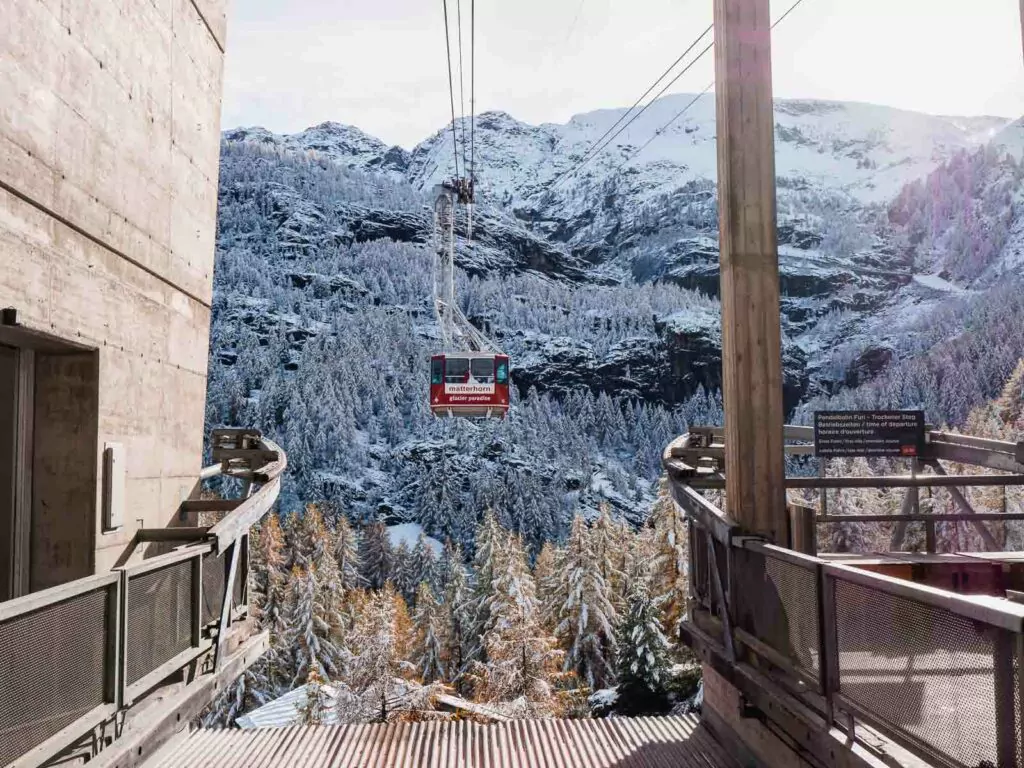
Swiss Half Fare Card pros
✅ Low cost: Only 150CHF for a month of travel, much cheaper than the Swiss Travel Pass
✅ Wide coverage: Discounted access to the whole Swiss Travel System network as well as most mountain railways and cable cars
✅ Better Jungfraujoch discount: 50% off (vs. 25% off with the Swiss Travel Pass)
✅ Longer validity: One month is the only option, vs. a maximum of 15 days with the Swiss Travel Pass (which is pretty expensive)
Swiss Half Fare Card cons
👎🏼 Need to buy every ticket: You still have to purchase a ticket for each journey
👎🏼 Panoramic trains still expensive: Even with the Half Fare discount some of the panoramic trains (*cough* Glacier Express *cough*) are still expensive!
👎🏼 Rigi & Stanserhorn not free: These mountains are just 50% off, unlike the Swiss Travel Pass
👎🏼 No museum access: There’s no museum access included
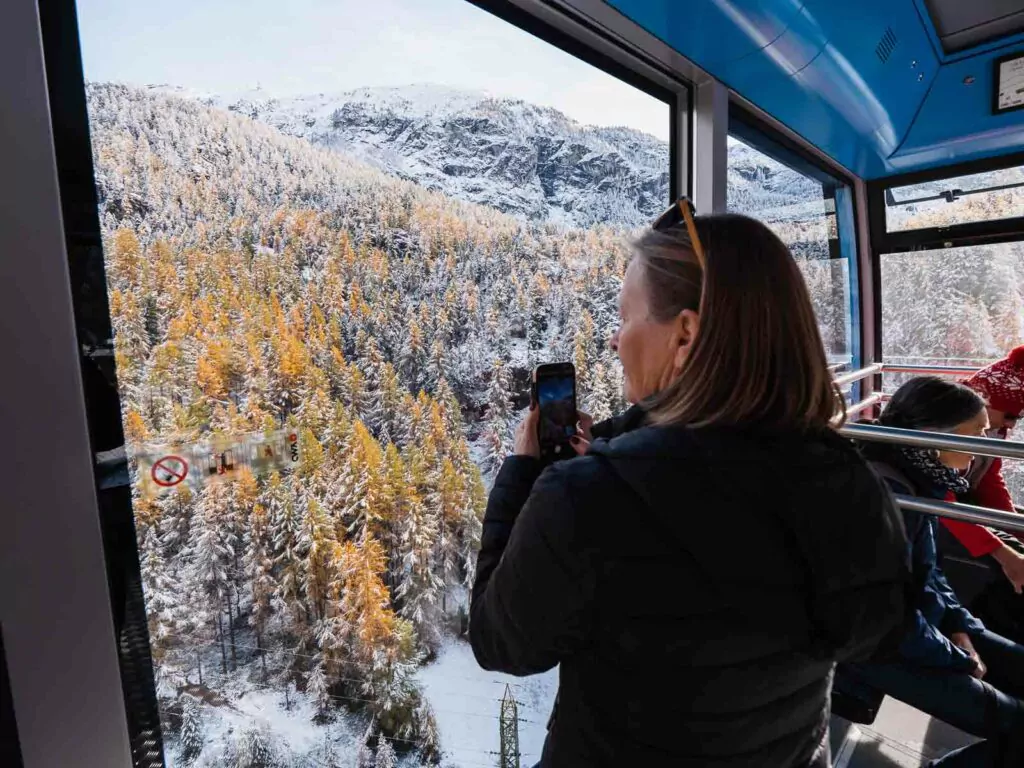
Who is the Swiss Half Fare Card best for?
- Budget-conscious travellers: It’s significantly cheaper upfront than the STP, and will likely save you more money unless you’re using long-haul trains or premium panorama trains extensively throughout your trip
- Mountain lovers: The 50% discount on most mountain railways is the same or better than the STP, and it includes a 50% discount on Jungfraujoch, which the STP only has at 25%
- Flexible itineraries: If your plans aren’t firm and you have no idea how much you’ll be travelling in Switzerland, the Half Fare Card only requires you to book 300CHF worth of transport before the card has paid itself off. With the Swiss Travel Pass it can be harder to hit the pass value without pre-planning.
- Longer stays: The one-month validity of the Half Fare Card is a plus if your trip extends beyond the 15-day limit of the STP
- Those who enjoy a bit of planning: If you’re willing to compare prices and book tickets in advance, the Half Fare Card usually wins in terms of cost-efficiency
Remember: The best way to determine the optimal choice is to create a rough itinerary and calculate the estimated costs with each pass. Your specific plans will always be the deciding factor!
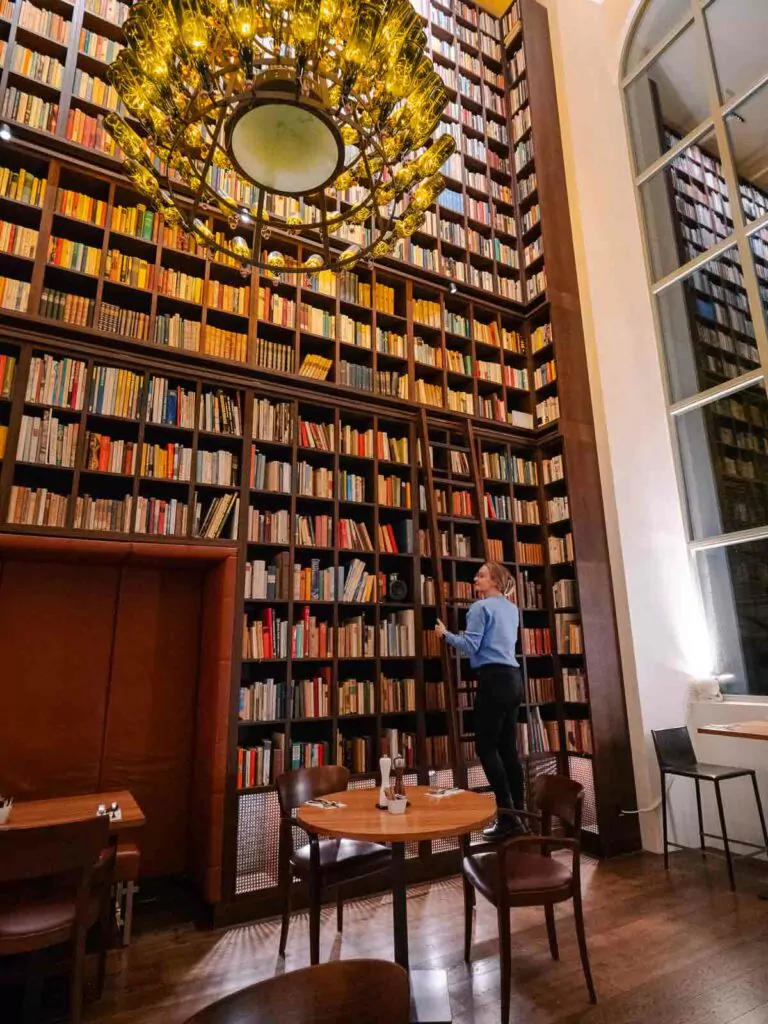
Costs of the Swiss Travel Pass vs Half Fare Card
Swiss Travel Pass prices
Here are the prices for adult passes in 2nd class. 1st class passes are about 60% more expensive than the prices you see below.
Prices valid as of 19 January 2026, they typically put prices up annually at the most so these should be valid for the remainder of 2026.
| How long | Swiss Travel Pass | Swiss Travel Pass Flex |
| 3 days | 254CHF | 289CHF |
| 4 days | 309CHF | 349CHF |
| 6 days | 399CHF | 424CHF |
| 8 days | 439CHF | 459CHF |
| 15 days | 499CHF | 519CHF |
- If you’re between 16 and 25 you’re eligible for a youth Swiss Travel Pass which is 30% off the prices above
- Kids aged between 6 and 15 (inclusive) gets free travel when accompanying a parent with a valid Swiss Travel Pass or Half Fare Card, you just need to order the free Swiss Family Card at time of purchase or pick one up from a train station once you’re in Switzerland
- Kids under 6 travel free
Swiss Half Fare Card prices
150CHF for one month.
No discounts for youth or seniors, you get half price travel on both first class and second class tickets.

Where to buy the Swiss Travel Pass or Half Fare Card
👉🏼 You can buy your Swiss Travel Pass online here
👉🏼 You can buy your Swiss Half Fare Card online here
Those links will direct your to Klook, my go-to platform for booking experiences and attraction tickets, and you can get 10% off your first Klook booking (including travel passes) with the promocode FINDINGALEXXKLOOK 💰
You can also buy both at train stations or transport hubs throughout Switzerland once you get there.
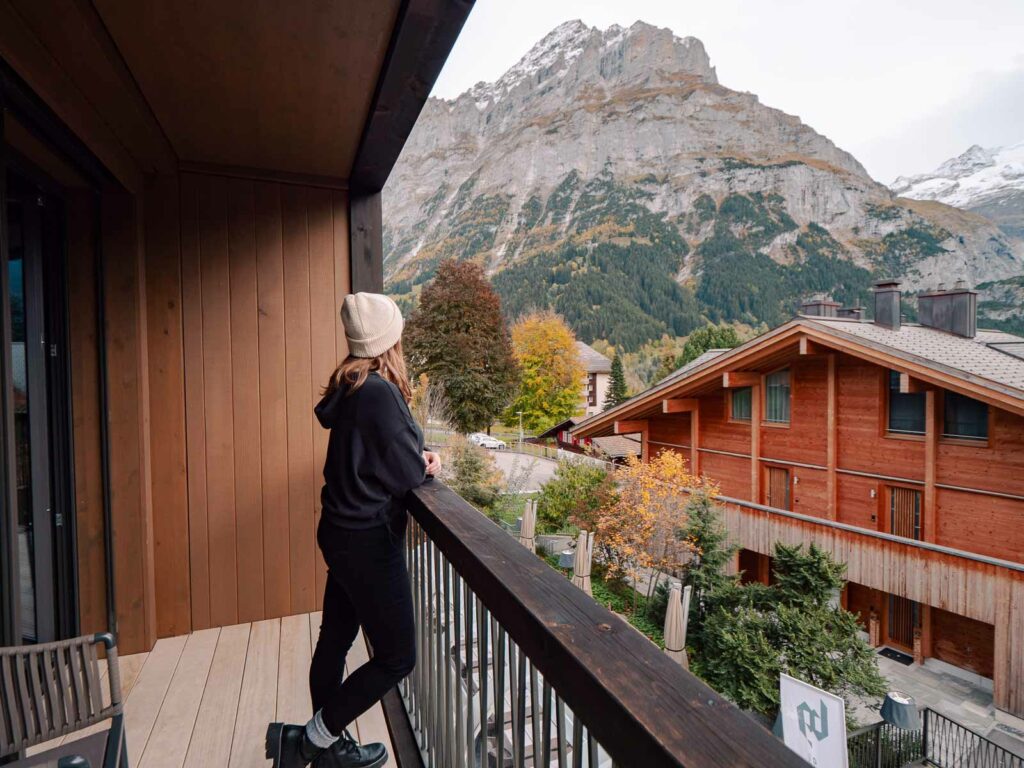
How to use the Swiss Half Fare Card or Swiss Travel Pass
Here are some step-by-step instructions on how to use the different passes.
How to use the Swiss Travel Pass
The Swiss Travel Pass acts as your train tickets, boat tickets and bus tickets, there’s no need to buy an additional ticket if you’re using a regional train/bus, going on a scheduled public boat trip or using public transportation. If you’re asked for your ticket, you can show them the PDF attachment on the confirmation email when you bought your pass.
If you want to use the mountain trains or cable cars which are only discounted with the Swiss Travel Pass (like Jungfraujoch, Pilatus or Titlis), you can go onto the official mountain website, search your travel date, and there will be a ‘discount’ or ‘travel card’ dropdown for you to select the Swiss Travel Pass, or sometimes there’s a specific category for pass holders like the example below.

You can also go to the ticket counter at the mountain and show your Swiss Travel Pass PDF and they’ll charge you the discounted Swiss Travel Pass rate.
How to use the Swiss Half Fare Card
With the Swiss Half Fare Card you’ll need to buy tickets for each and every trip you make.
If you’re using public transport or regional trains, boats or buses, you need to go onto the SBB app or website and find the route you want to book. Click through to purchase the tickets and you’ll get a pop up asking you to add a passenger. Add your details, and in the ‘discount cards’ dropdown select ‘Half Fare Travelcard’ like below.

The Half Fare Travelcard technically is the name for the annual half price travelcard that’s available to Swiss residents only, but Half Fare Card holders get the exact same benefits on the Swiss Travel System and the SBB annoyingly doesn’t have a ‘Half Fare Card’ option in the dropdown, so this is the only way to book half price.
When you catch your trip you might be asked to show your Half Fare Card, just show them the details in your confirmation email.
If you’re booking mountain excursions then there will be a dropdown to add your Half Fare Card or a specific category for you to select the Half Fare price.
Swiss Travel Pass vs Swiss Half Fare Card: Example itineraries
The best way to understand the difference in value between the Swiss Travel Pass and the Swiss Half Fare Card, and to determine the best option, is to show you some example itineraries.
Each of these example itineraries is using prices for tickets booked one week in advance. Keep in mind that you could get slightly cheaper full fare/half fare tickets if you booked further in advance, and would likely end up paying a bit more if you booked last minute.
All prices are based on shoulder season travel in May or October and are valid as of January 2026.

Three days in Switzerland
Let’s assume you are just doing a whirlwind trip to Switzerland where you’ll spend some time in Zurich, then catch the train to Chur, do the Glacier Express to Zermatt, then head to Geneva over three consecutive travel days.
- Zurich to Chur
- Chur to Zermatt (Glacier Express)
- Zermatt to Geneva
| Full fare | Swiss Travel Pass | Swiss Half Fare Card | |
| Zurich to Chur | 42 | 0 | 21 |
| Glacier Express | 124 | 0 | 62 |
| Zermatt to Geneva | 106 | 0 | 53 |
| Pass cost | 0 | 254 | 150 |
| TOTAL | 272 | 254 | 286 |
🥇 Winner: In this example the Swiss Travel Pass is the best choice.
You’ll save 7% using the Swiss Travel Pass vs the Half Fare Card, and 11% compared to buying individual tickets. You’ll also get the added benefit of free museums in Zurich and Geneva, and you can just jump on whatever Zurich-Chur train and Zermatt-Geneva train you want to, no need to book tickets for a specific time.
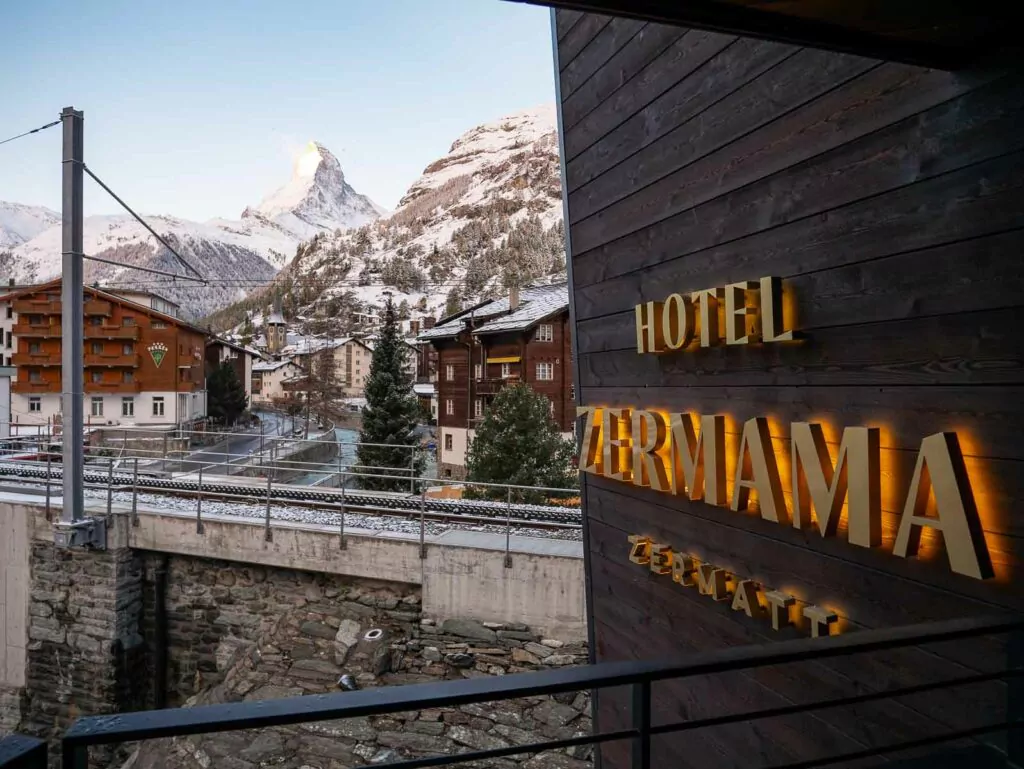
Five days in Switzerland with the Glacier Express
For this one I’m using my five days in Switzerland itinerary, which includes:
- Zurich to Interlaken
- Interlaken to Grindelwald-First day trip
- Interlaken to Jungfraujoch day trip
- Interlaken to Zermatt
- Zermatt to St Moritz (Glacier Express)
- I’ve thrown in an extra day for a Gornergratbahn excursion from Zermatt to make use of the full six day Swiss Travel Pass
| Full fare | Half Fare Card | Swiss Travel Pass | |
| Zurich to Interlaken | 73 | 36.50 | 0 |
| Grindelwald-First day trip | 105.60 | 52.80 | 38 |
| Jungfraujoch day trip | 261.20 | 130.60 | 179.60 |
| Interlaken to Zermatt | 86 | 43 | 0 |
| Gornergratbahn day trip | 132 | 66 | 66 |
| Glacier Express | 159 | 79.50 | 0 |
| Pass cost | 150 | 399 | |
| TOTAL | 816.80 | 558.40 | 682.60 |
🥇 Winner: In this example, you’d save 18% using the Swiss Half Fare Card vs the Swiss Travel Pass, and 32% compared to buying individual tickets.
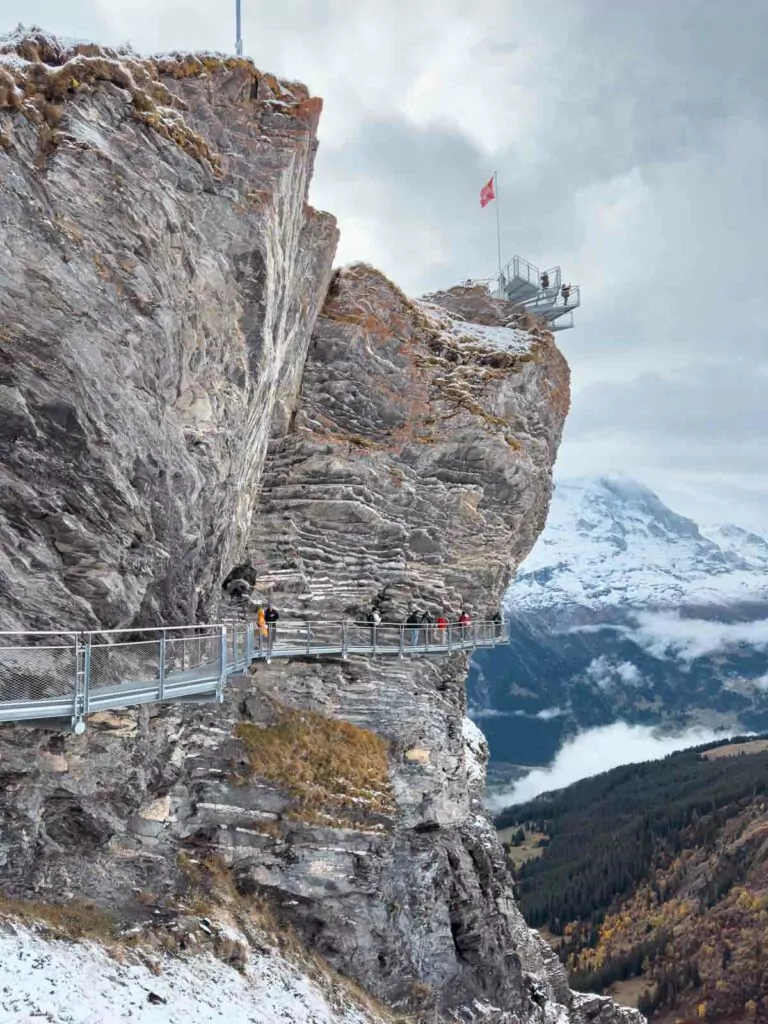
10 days in Switzerland
For this one lets use my 10 day Switzerland trip.
- Zurich to Lucerne
- Rigi excursion
- Pilatus excursion
- Lucerne to Interlaken
- Jungfraujoch excursion
- Grindelwald-First excursion
- Harder Kulm
- Interlaken to Zermatt
- Gornergratbahn excursion
- Matterhorn Glacier Paradise excursion
- Glacier Express to St Moritz
- Bernina Express to Tirano
Phew! This itinerary would require an 8 day Swiss Travel Flex pass, leaving two days for shorter trips or local travel that isn’t worth a travel day.
| Full fare | Half Fare Card | Swiss Travel Pass | |
| Zurich to Lucerne | 27 | 13.50 | 0 |
| Rigi excursion | 122.60 | 61.30 | 0 |
| Pilatus excursion | 119.80 | 59.90 | 42 |
| Lucerne to Interlaken | 34 | 17 | 0 |
| Grindelwald-First day trip | 105.60 | 52.80 | 38 |
| Jungfraujoch day trip | 261.20 | 130.60 | 179.60 |
| Harder Kulm | 44 | 22 | 22 |
| Interlaken to Zermatt | 86 | 43 | 0 |
| Gornergratbahn | 132 | 66 | 66 |
| Matterhorn Glacier Paradise | 120 | 60 | 60 |
| Glacier Express (Zermatt to St Moritz) | 159 | 79.50 | 0 |
| Bernina Express (St Moritz to Tirano) | 33 | 16.50 | 0 |
| Pass cost | 150 | 439 | |
| TOTAL | 1244.20 | 772.10 | 846.60 |
🥇 Winner: Another one with the Swiss Half Fare Card taking the top spot, saving 9% compared to the Swiss Travel Pass Flex but saving 38% vs. individual tickets.
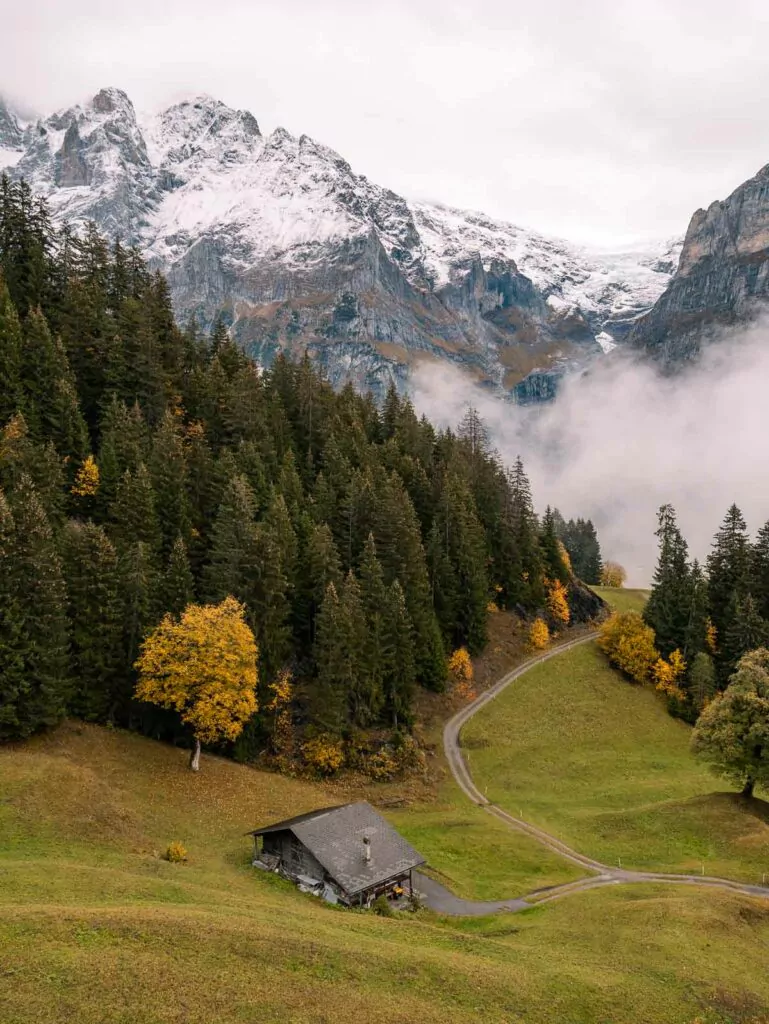
15 day Grand Train Tour of Switzerland
The Grand Train Tour of Switzerland is an epic 1280km journey, using the premium panoramic trains to visit places like Zurich, Lucerne, Interlaken, Montreux, Zermatt, St Moritz and Lugano.
If you’re looking for a bucket list train adventure, this is it. Let’s take a look and see if the Swiss Half Fare Card or Swiss Travel Pass comes out on top, assuming you want to include a couple of mountain excursions and city breaks along the way.
- Zurich to Interlaken
- Jungfraujoch excursion
- Day on the Interlaken lakes
- Interlaken to Montreux (GoldenPass Express)
- Montreux to Zermatt
- Gornergrat excursion
- Zermatt to St Moritz (Glacier Express)
- St Moritz to Lugano (Bernina Express to Tirano + bus connection to Lugano)
- Lugano to Lucerne (Gotthard Panorama Express)
- Rigi excursion
- Stanserhorn excursion
- Pilatus excursion
- Lucerne to St Gallen (Voralpen-Express)
- St Gallen-Schaffhausen-Zurich
- This uses 12/13 travel days depending on what places you want to overnight at, which leaves a few extra days of the Swiss Travel Pass to add on regional trips to smaller towns or mountain villages
| Full fare | Half Fare Card | Swiss Travel Pass | |
| Zurich to Interlaken | 73 | 36.50 | 0 |
| Jungfrau excursion | 261.20 | 130.60 | 179.60 |
| Day on the lakes | 83 | 41.50 | 0 |
| Interlaken to Montreuz (GoldenPass Express) | 56 | 28 | 0 |
| Montreux-Visp-Zermatt | 76 | 38 | 0 |
| Gornergratbahn | 132 | 66 | 66 |
| Zermatt to St Moritz (Glacier Express) | 159 | 79.50 | 0 |
| St Moritz to Tirano (Bernina Express) | 33 | 16.50 | 0 |
| Tirano to Lugano (Bernina Express bus) | 41 | 20.50 | 0 |
| Lugano to Lucerne (Gotthard Panorama Express) | 135 | 67.50 | 17 |
| Rigi excursion | 122.60 | 61.30 | 0 |
| Pilatus excursion | 119.80 | 59.90 | 42 |
| Stanserhorn excursion | 97.60 | 48.80 | 0 |
| Lucerne to St Gallen to Zurich | 73 | 36.50 | 0 |
| Pass cost | 150 | 499 | |
| TOTAL | 1462.20 | 881.10 | 803.60 |
🥇 Winner: And the 15 day consecutive Swiss Travel Pass is the best option for the Grand Train Tour itinerary, saving 9% vs. the Half Fare Card or a massive 45% compared to full fare tickets.
If you ended up doing more mountain excursions then the Swiss Half Fare Card miiiight end up being the cheapest option, or if you were travelling at a faster pace and could cut the trip to fit into an 8 day consecutive pass then the Swiss Travel Pass would save you even more.
Alternatives to the Swiss Travel Pass or Half Fare Card
Regional or area passes
If you’re concentrating on a particular region in Switzerland, or you have a decent chunk of your trip in one area, then a regional pass might save you even more than a Swiss Travel Pass or Swiss Half Fare Card.
Regional passes differ on exact inclusions as they’re run by different regions (duh) so you’ll need to check the details to see if it would work for your trip.
Popular regional passes include:
- The Jungfrau Travel Pass for the Jungfrau region (Jungfrau, Grindelwald, Interlaken, Lauterbrunnen, previously known as the Top of Europe Pass)
- The Berner Oberland Pass for the Bernese Oberland (includes Jungfrau region but the validity extends further, only offers discounts on Jungfraujoch and other Jungfrau Railways-owned excursions)
- The Tell Pass for the Lake Lucerne region (Lucerne, Rigi, Pilatus, Titlis, Stanserhorn)
- The Peak Pass for the Zermatt region (Gornergrat, Matterhorn, Rothorn)
Regional passes fully cover most mountain railways/cable cars in that area so if you’re planning on visiting multiple mountains in one region, it could be more cost effective than the Swiss Travel Pass or Half Fare Card.
Some you can even combine with the Half Fare Card, and get a discount on the regional pass price! A combo of the Swiss Half Fare Card and Jungfrau Travel Pass can be the perfect option if you’re spending three or more days in the Jungfrau region.
I’ve got detailed breakdowns of two regional travel passes on offer:
👉🏼 My Jungfrau Travel Pass guide (includes a comparison with the similar Berner Oberland Pass)
👉🏼 My Tell Pass (Lake Lucerne region) guide
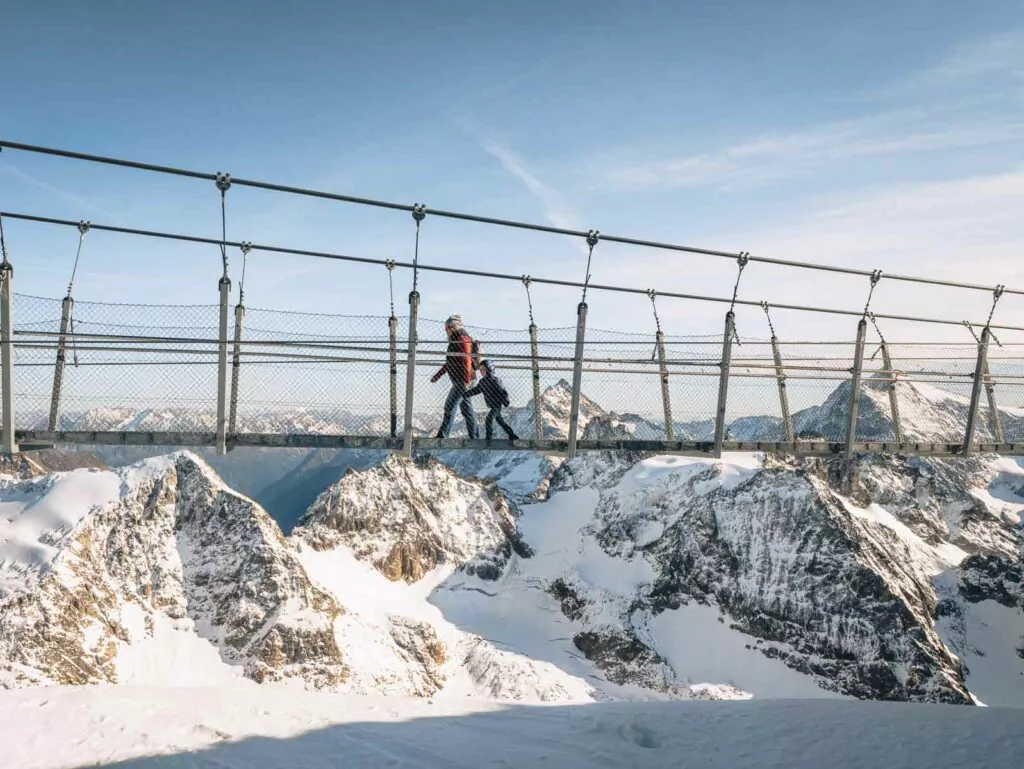
Individual tickets
Booking point-to-point tickets for the full fare price is almost never good value, unless you’re only in Switzerland for a day or two.
If you’re going to spend at least 300CHF on transport (easily done with two long trips and one mountain excursion) then the 150CHF Half Fare Card will save you money vs. buying regular tickets at a full fare rate.
Supersaver tickets
One type of individual ticket that can be a good deal is a Supersaver ticket. A Supersaver ticket is like the first batch of seats sold on a flight, super discounted but very limited with no flexibility, valid for a specific train and exact departure time.
You can book a Supersaver ticket up to six months in advance, and if you know your exact plans then they can end up being pretty decent value. You can also combine a Supersaver ticket with a Half Fare Card to get an even cheaper ticket price.
Just keep in mind that these are non-refundable and non-changeable, so if you have any doubt about your plans, don’t buy one or you’ll lose the money if you have to change to a different train time.
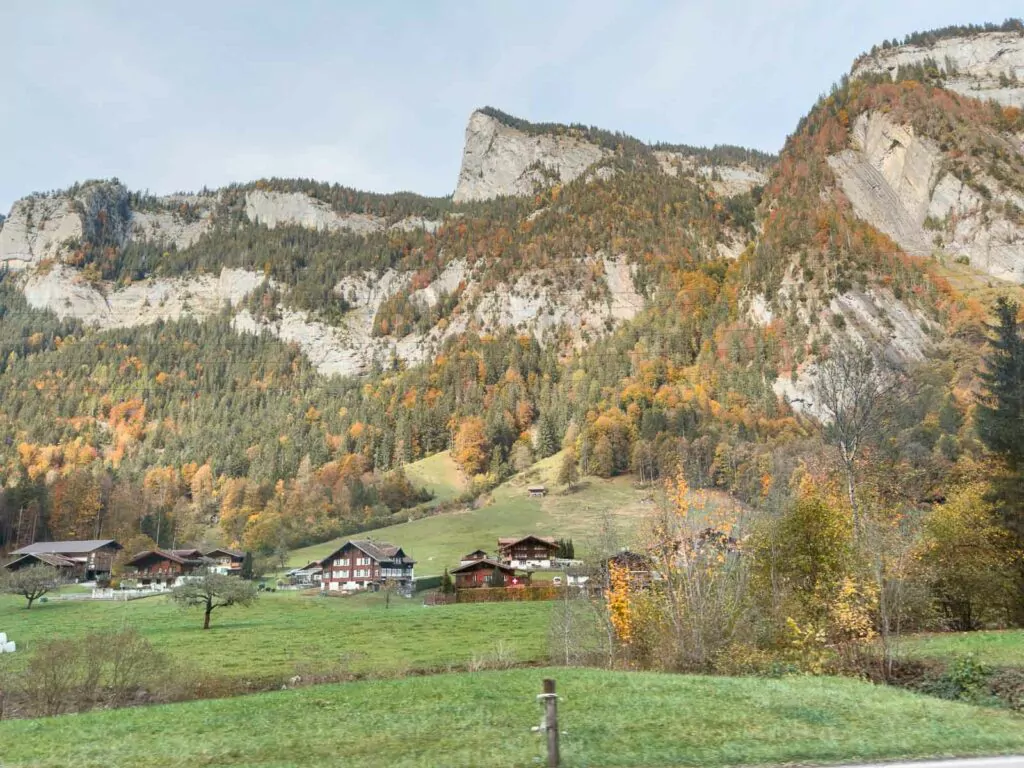
Saver Day Passes
A Saver Day Pass is pretty much a one-day Swiss Travel Pass, giving you unlimited travel across Swiss trains, buses and boats for a whole day for a flat fee. You can combine them with the Half Fare Card to get a Saver Day Pass at a discounted rate (not half price, generally between 15-45% cheaper depending on demand).
Saver Day Passes are priced based on demand, so if you want to buy one for tomorrow it might be 69CHF with a Half Fare Card or 119CHF without a Half Fare Card, but if you bought one for 6 months from now (the earliest you can buy) it could be as low as 29CHF with a HFC or 52CHF without one.
This can be used on panoramic trains like the Glacier Express (and it’s a great way to get the Glacier Express for a low price without having to splurge on a Swiss Travel Pass), but they aren’t valid for most mountain railways and cable cars.
Eurail/Interrail passes
The Eurail Global Pass and Interrail Global Pass are rail passes that cover most countries in Europe, including Switzerland.
They cover the train network in Switzerland on the Swiss Travel System, including inter-city trains and scenic trains like the Glacier Express and Bernina Express, but they don’t cover boats, buses, public transport within cities, museums or any mountain railways or cable cars (though you’ll often get a 25% discount, maybe 50% for some).
I love travelling with a Eurail Pass (I have a whole Eurail travel guide here) but because of their limitations within Switzerland and lack of coverage for mountain excursions, they don’t provide great value here.
If you’re travelling by train around Europe then I’d recommend using your Eurail Pass for other countries, or just using it for long inter-city trains and panorama trains in Switzerland, then get a Half Fare Card and/or regional travel pass to bring your costs down for mountain excursions.
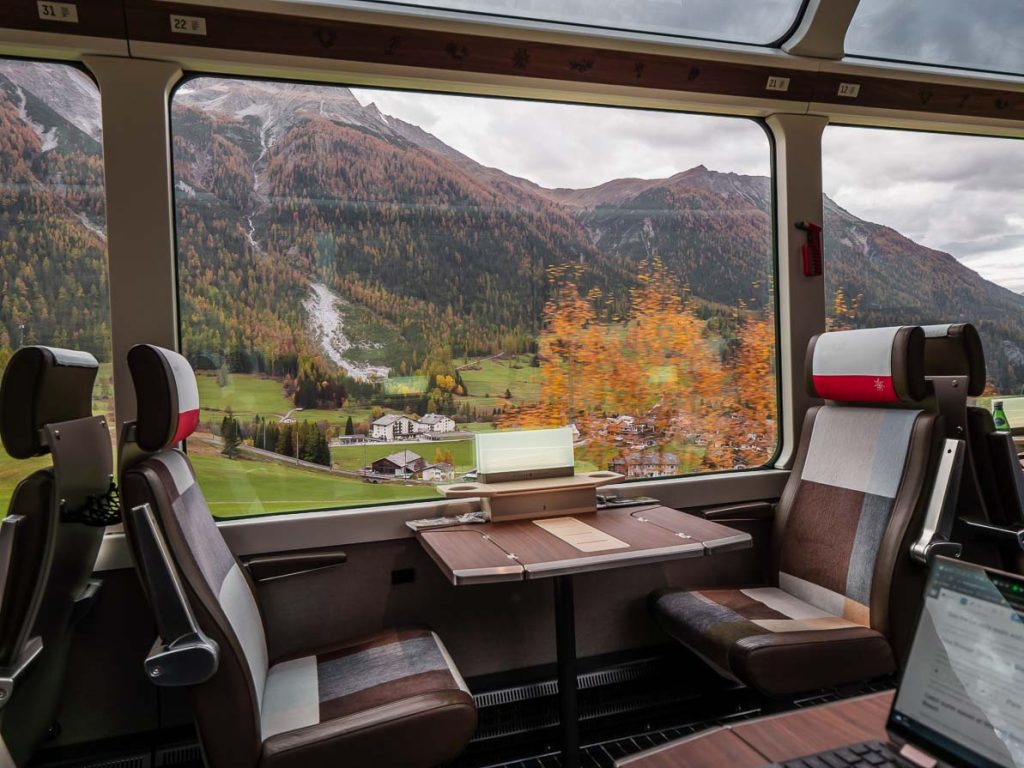
Swiss Travel Pass vs Swiss Half Fare Card FAQS
Is there an app for the travel passes?
There’s no app specifically for the Swiss Travel Pass or Swiss Half Fare Card, when you buy your chosen Swiss pass you’ll get an email with a PDF showing your pass details and QR code, and you can show this to train conductors or ticket checkers when asked.
You should download the SBB app though, this is the official app for the Swiss Travel System and is the best way to buy tickets with your Half Fare Card or to check timetables.
Does the Swiss Half Fare Card or Swiss Travel Pass work in other European countries?
Nope, the any Swiss travel pass or card will only work in Switzerland, but if you’re travelling from Switzerland into a neighbouring country you will get the appropriate discount on the Swiss portion of your trip.
A valid Swiss Travel Pass covers travel right up to the Switzerland border, so you just need to pay for the fare from the train station at the border to your international destination. Using Zurich to Milan as an example, you’ll get free travel to Chiasso and then just have to pay for a ticket from Chiasso to Milan.
With a valid Swiss Half Fare Card, you can just search on the SBB app or website for your train, select ‘Half Fare Travelcard’ in the discount dropdown, and it’ll show you the price for a half fare ticket from Zurich to Chiasso and then full fare from Chiasso to Milan.
Are the Swiss Half Fare Card and Swiss Travel Pass for tourists or Swiss residents?
The Swiss Half Fare Card and Swiss Travel Pass have been created for travellers visiting Switzerland for a short trip.
There are similar passes available to Swiss residents though.
The GA Travelcard for Swiss residents covers unlimited travel on SBB trains, most other railways and many other public transport networks in Switzerland. It generally covers mountain transport that provides access to residential areas, but for tourist mountain excursions like Jungfraujoch or Titlis it will just provide a discount or nothing at all. The GA Travelcard is valid for a minimum of six months, and you can’t cancel it earlier than that.
The Half Fare Travelcard for Swiss residents is similar to the Swiss Half Fare Card for tourists, but with a one year validity.
The final verdict: Swiss Travel Pass vs Swiss Half Fare Card
As you can see from the example itineraries above, the best value pass really does depend on the exact routes and excursions you’re taking.
Based on my experience of planning Switzerland trips that combine a mix of city breaks, panoramic trips and mountain excursions, the Half Fare Card often comes out as being a bit cheaper than the Swiss Travel Pass, maybe 10-20% on average. The downside is the inconvenience of having to book tickets for every trip, but if you need to pinch the pennies then the saving might be worth the extra time it takes to plan.
The Swiss Travel Pass on the other hand is often (not always) slightly more expensive, but you get the benefit of total flexibility to jump on different transport without pre-booking. This pass is particularly good value if you’re doing the (very expensive) Glacier Express or the epic Grand Train Tour and are happy to keep your mountain excursions to Rigi and Stanserhorn (free with the STP), but if you’re doing lots of other mountain trips you’ll probably find the Half Fare Card a better deal.
And finally, if you’re keen to tick Jungfraujoch off your Switzerland bucket list then consider combining the Swiss Half Fare Card with the Jungfrau Travel Pass for excellent value for money.
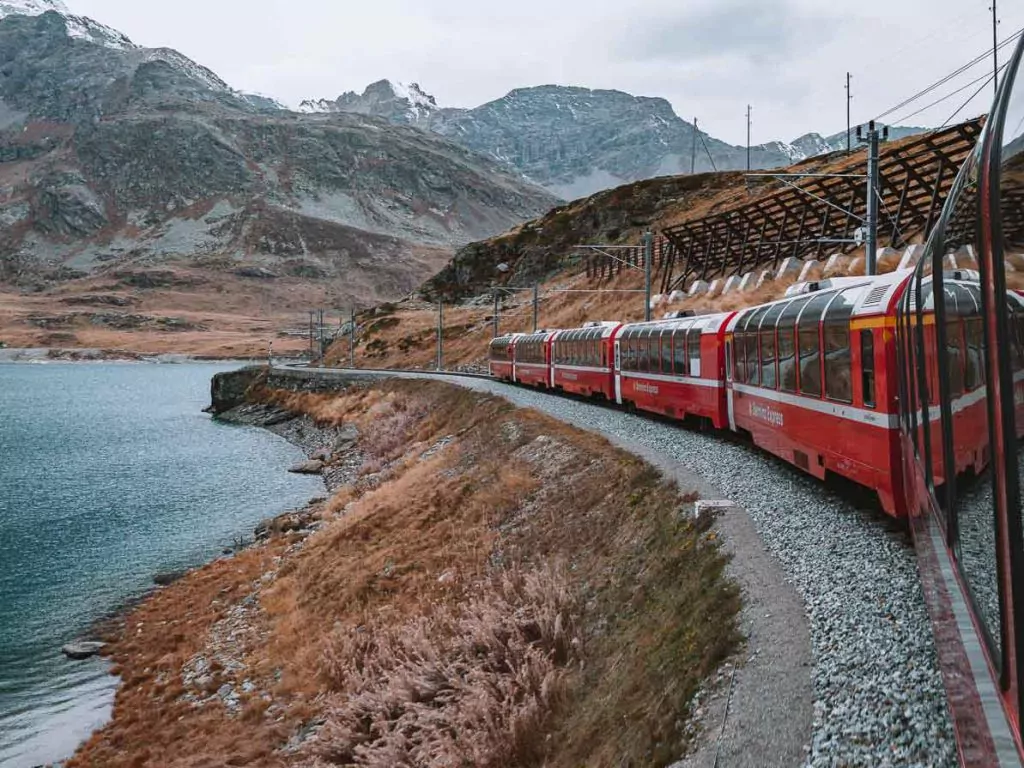
I hope this detailed breakdown of the Swiss Travel Pass vs Half Fare Card has helped you figure out which of the Swiss travel passes is best suited to your upcoming Switzerland adventure.
As always, if you have any questions please let me know in the comments below!
MORE SWITZERLAND TRAVEL INSPIRATION:
- How to spend 5 days in Switzerland
- How to spend 10 days in Switzerland
- 33 most beautiful places in Switzerland
- Rigi vs Pilatus vs Titlis vs Stanserhorn: Which one to visit?
- The cheapest place to ski in Switzerland: Liddes Ski Hostel
- 10 reasons to try co-living in Switzerland
- The ultimate Northern Italy and Switzerland itinerary
MORE SWITZERLAND TRAIN GUIDES:
- Swiss Travel Pass vs Half Fare Card: Which one is best?
- The ultimate Swiss Travel Pass guide
- The ultimate Swiss Half Fare Card guide
- Is the Glacier Express worth it?
- Is the Bernina Express worth it?
- Bernina Express vs Glacier Express: Which one should you choose?
- Is the Jungfrau Travel Pass worth it?
- Is the Tell Pass worth it?
MY GO-TO TRAVEL PLANNING RESOURCES
Flights ✈️ I use Skyscanner to find the best flights for my trip and then I’ll always book direct with the airline to protect myself from having to deal with dodgy third parties if anything goes wrong.
Trains 🚂 If I’m travelling through Europe, I try to travel by train wherever possible! For an extended trip (2+ weeks) I’ll calculate if a Eurail Pass is worth it, or I’ll book point-to-point tickets through RailEurope or the local train operator.
Accommodation 🛎️ I book almost all of my accommodation through booking.com, they have a user-friendly website + app and many of their options are free cancellation, easily cancelled with a simple click of a button.
Activities 🗽I use GetYourGuide, Klook and Viator to look for activities in the places I visit, or I just Google ‘things to do in [city]’! P.S. If you book anything on Klook you can use the promocode FINDINGALEXXKLOOK to get 10% off
Travel cards 💳 I’m a Wise gal through and through, they’ve been my chosen travel card for more than five years now. You can easily top up your card from your bank account or through Apple Pay, convert your money to local currency, and spend money with minimal fees and the best exchange rates around.
Travel insurance 🩺 I use Cover-More NZ travel insurance for my own trips, I have a comprehensive policy and I’ve only had good experiences with them. Cover-More also has an Australian company, but if you’re from elsewhere then two popular insurance options for global travellers are SafetyWing (cheaper policy, lower coverage) and World Nomads (more expensive but significantly better coverage).
Luggage 💼 I travel with Samsonite Cosmolite suitcases, one 75cm check in bag and a 55cm carry on bag, and I absolutely adore them and will never travel with anything else! They are SUPER lightweight (2.8kg and 1.9kg respectively) so I have much more space for my actual stuff.
Camera gear 📸 I use a iPhone 15 Pro Max for phone photos/videos, and my camera kit includes a Lumix S9 (incredible lightweight full-frame camera, a game changer for travel creators!) with a 20-60mm lens, a Lumix G9 with an 8-18mm and 12-60mm lens, a DJI Mini 3 Pro drone and a GoPro Hero 10. I do all my writing and editing on my ASUS Zenbook 14, it’s lightweight but powerful enough for photo editing and intense blogging sessions.
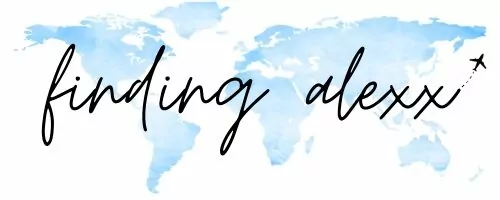
Hey Alexx, first off, kudos on your fantastic blog and Instagram content! Your posts are filled with captivating pictures and valuable information.
Regarding this particular post, I’ve got a couple of questions about the half fare ticket. If I opt for the half fare ticket and happen to book my travels last minute, will I still receive the 50% discount despite possibly facing a higher price? Also, I generally have a good idea of my itineraries, but sometimes plans shift a bit. So, if I purchase a train ticket with the half fare for a specific hour and later decide to adjust my travel time on the same day and route, would there be any issues with that?
Appreciate your insights! Thanks a bunch!
Thanks for your feedback Aimara 🙂 that’s so kind of you to share.
There are different types of tickets available for SBB network. There are SuperSaver tickets which are the cheaper options but are for a specific train time (so only buy this if you’re 100% certain you’ll take that train), but these tickets are limited so they might sell out. If they sell out you’ll need to book a point-to-point ticket which is a bit more expensive but means you can take any train on that route that day.
You can choose to book either and your Half Fare Card gives you a straight 50% discount on whatever ticket price. I hope this helps!
Hi Alexx
Your post is so helpful. I am planning my first trip to Switzerland.
If I buy Swiss Travel Pass, I do not need to worry if the ticket is sold out or not, just jump on to the trip, correct?
Thank you so much
Meg
Hey Meg! Most Swiss trains don’t require reservations, meaning you can just jump onto the train and show your pass as your ticket, but some panorama trains (like the Glacier Express and Bernina Express) and some mountain excursions will require pre-booking.
Really great article. Very helpful and detailed! Some follow up questions regarding the Swiss half fare card and the Swiss travel Pass.
Your links to purchase them are through klook.com
Why not directly through SBB website?
We are trying to choose between the two passes for a six day trip in Switzerland.
Starting June 24th, we will be traveling by train from Basel to Interlaken, including a trip to Jungfrau.
Then from interlaken to Lucerne and then back to Basel.
If we choose to buy the half fare card, then we will have to purchase tickets via the SBB app. How do we show those purchased tickets at the train station? Trying to figure out how much of a hassle it will be vs getting the Swiss travel pass.
Many thanks for all your valuable analysis and advice.
Hey Anjali 🙂 To answer your questions:
– Klook is a global experiences company with loads of travel passes, attraction tickets and tours around the world, I use them on my blog because they give me a small commission when someone makes a purchase (which lets me spend more time making long and detailed posts haha) AND they have just given me a promocode to share with my readers, so you can save 10% on most Klook experiences (including the Swiss Travel Pass) with the promocode FINDINGALEXX
– The SBB website and Klook are the exact same price so with the promocode discount it’s better for you to book with Klook, but if you prefer to go direct then of course you are more than welcome to do so 🙂
– If you get the Half Face Card and buy tickets on the app, if you’re taking a normal inter-city train (not a mountain railway/cable car) then you simply buy the ticket on the app, board the train, and once it’s moving, a ticket checker will go through the train to check everyone has tickets. Just bring up your ticket on the app, have your Half Fare Card details there too, and you’re good to go. Not a hassle at all, because with the Swiss Travel Pass you will still need to show the ticket checker your pass anyway.
– With the mountain railways/cable car you can either buy half fare tickets online or at the ticket stalls when you get there, sometimes you will get a QR code to your email that you can use for entry and sometimes you might need to go to a ticket stall for a physical ticket, you’ll just have to check when you get there.
Let me know if you have any further questions.
Hi Alexx!
Thanks for this article. My daughter will be on a summer research program in Zurich for 2 months. She will fly to Paris, take a train to Zurich and also come back home from the Paris airport. Her plan is to travel around Switzerland and to a few of the adjacent countries during her weekends. In addition she will need to travel in the bus or train to her research location in Zurich on a daily basis. This is her first trip to Europe, she is 18 and will be traveling alone.
Can you please give her recommendations on the train pass she should purchase (Eurorail vs Swiss Pass) and what she should purchase locally for Switzerland / Zurich (Swiss vs Half Card vs ?).
Another question, does local travel inside Zurich will be counted as a travel day on the Eurorail or Swiss Pass?
All your help will be deeply apreciated.
Fernando
Hi Fernando, what an amazing opportunity for your daughter.
The best pass will entirely depend on her actual itinerary, so I can’t say with certainty what she should do. She should look at my Eurail calculations blog post for a better idea of how to calculate whether it’s worth it: https://findingalexx.com/is-a-eurail-pass-worth-it/
In saying that though, based on the info you’ve shared I would probably recommend the following:
– Get a Swiss Half Fare Card for local travel, these last 30 days so she will need to get two. This will give her half price on local transport in Zurich + trains to other parts of Switzerland + most mountain excursions.
– Get a Eurail Pass for her international trips only if the value of the trips is going to be high. She will need to calculate seat reservations + the pass cost and compare that to the cost if she just booked the trips outright. France has high seat reservation costs so if she’s visiting France for weekend trips it might not be worth getting a Eurail Pass, but if she’s heading to Germany, Italy, Austria etc. or further afield then it could definitely be worth it.
Hope that helps!
Thanks!!
Hi Alexx (I love the double x:) I’m so happy to have found your site. I’m planning first trip to Switzerland with my husband and 29 year old daughter for 12 days in July. Fly into Geneva and head to Bern for 2 nights, lauterbrunnen 4 nights, zermatt 2 nights, Annecy France 2 nights and fly out of Geneva.
My question is this. Since we are 3, would it make sense to rent a car to get us from place to place? Car rental will cost about $800. I realize we can’t drive to zermatt.
I also realize I will need some sort of pass for our stay in lauterbrunnen for mountain visits. And I will certainly purchase the pass thru your site! You explained it all so well!
Thank you for your help!
Hey Tami 🙂 I haven’t actually rented a car in Switzerland before because it’s way too expensive as a solo traveller, and I love the train experience and views! You’d need to figure out an approximate cost for gas (quite expensive, I believe it’s about twice the price of gas in the US) plus parking and compare that with the trains to get a better idea of what would be best value. Sorry I can’t be of more help!
Thank you!
Hi Alexx, This is a fantastic blog. I love the details and the suggested itineraries. I am seeking advice. We are a family of four, with two young kids, travelling next week. We plan to visit Zurich, Lucerne, and Berne for a week next week.
Could you please advise us on which travel pass would be advisable, the Swiss travel pass or the half-fare pass?
Hey Shraddha! I can’t do a detailed budget breakdown without knowing your exact dates and plans for excursions/museums, but the Swiss Travel Pass will give you more flexibility and convenience for last minute bookings, it covers a bunch of museums in those cities, and also gives you free access to Rigi and Stanserhorn which are two of the main mountain excursions from Lucerne, so I’d say that would probably be my suggestion.
And you can get 10% off the passes using the promocode FINDINGALEXX at this link: https://www.klook.com/activity/11366-swiss-travel-rail-pass
Hi Alexx, Thank you so much for your prompt response. 🙂 Thank you again for sharing such a well-researched blog.
Hi,
Your website is SO helpful – thank you so much for this information! I’m hopeful you can help with a suggestion for which train pass makes sense. We are a family of 6, our children are 13, 19, 21, 23. Here is our itinerary, we arrive in Zurich on July 1 and are putting this together last minute. I’m struggling to make sense of which pass (if any) makes sense for us. (Or if we should just rent a couple of cars to get around?) We would like to not spend an unnecessary fortune, but also want our trip/traveling to not be stressful.
Day 1: (July 1) Arrive Zurich airport, take train to Lucerne
Days 1, 2: Explore Lucerne, including the lake, museums (Sammlung Rosengart, Lion Monument, Transport Museum, Bunker Private tour). The degree to which we lean towards indoor activities depends on the weather.
Day 3: Pilatus, other local activities if time permits afterwards
Day 4: travel to Murren via train/gondola/train and explore the immediate Murren area this first day.
Day 5, 6: Explore Lauterbrunnen/other villages, Waterfalls, Hikes, Jungfrau (weather dependent)
Day 7: Murren to France via transport van (already booked)
Thank you for any help or suggestion you can provide.
Hi,
Your website is SO helpful – thank you so much for this information. we will be travelling to Switzeland end of Nov around 20 Nov till 3 Dec. Still undecided to buy STP or HFC as both of us are seniors. We will travel from Munich to Lucerne – Interlaken-Geneva-Zermatt- Zurich before leaving Switzeland. What is your advise?
if we buy STP, when we buy ticket from Munich , how should we buy the train tickets? Thanks in advanced
Hello! It’s really impossible for me to say which one is going to be best without knowing your full itinerary, e.g. will you be doing mountain excursions, do you have set train times to take or do you want to be flexible, are you interested in the panorama trains etc. There are no senior discounts for either card option unfortunately.
If you already know the exact trains you want to take, like what time you want to depart, then the Half Fare Card is probably going to give you the best value. If you want to stay flexible with your train times but know exactly what days you want to travel, you could buy the Half Fare Card and use it to get discounted day pass tickets for those days. If you want full flexibility and want to just take whatever train works for you on whatever day you feel like travelling, then the Swiss Travel Pass offers ultimate flexibility.
Thanks Alexx for your clear instructions on navigating SBB and the pass options! Regarding travel between Annecy, France and Geneva – on the SBB site, 3 ticket choices appear, all named Leman Pass Individual ticket, each with a different price. There is no price change if I enter my Half Fare Travelcard and no full fare/point to point price. I understand the Leman Pass is for cross border travel between France and Switzerland, but do I have to purchase this Leman Pass in addition to the ticket price? (Is it a similar situation to needing to purchase the Half fare card for CHF120 in order to get the half fare discount?) I’ve yet to find an English Leman Pass link that explains this. Thanks
Hi Carol 🙂 From what I understand, the Leman Pass is the name of the ticket for cross-border travel (rather than being an actual ‘Pass’) so you can just book the Leman Pass Individual Ticket and this is all you need to catch that train. The Half Fare Card isn’t valid for trips from Geneva to Annecy because it’s only valid inside Switzerland itself, and I believe this route is serviced by the SNCF (France’s national railway) rather than the SBB. But this is just my understanding, you might want to check with SBB directly to make sure this is correct.
Hi alexx! you blog is very helpful and informative! In fact, your blog is my “go-to” for research <3
Me and my partner are travelling around Europe and it's our first time. Our itenerary includes France-Switzerand-Italy so Eurorail global pass is a must!! Do you reckon to get the swiss half fare card on top of our eurorail global pass? We are planning to do lots of mountain excursions.
Or maybe the Jungfrau Travel Pass is the best add on with our eurorail global pass? I am thinking to go to zurich, lucerne, interlaken, grindlwald, lauterbunnen , and maybe zermatt. That is my tentative switz itinerary (still doing heaps of research) I am just planning ahead of time though our trip will still be around September 2025 🙂
Hey Steph 🙂 If you’re looking for the combo of passes that’ll save you the most money, you really need to calculate it based on your exact (or exact as possible) itinerary. It’s impossible to know for sure whether the Half Fare Card or the Jungfrau Pass will be best for you without knowing which exact mountain excursions you’re planning on doing. You can also combine the Jungfrau Travel Pass with the Half Fare Card too!
Best thing to do would be to make a spreadsheet with each of your journeys and excursions, then compare the prices with each of the passes, add up those prices with the cost of the pass, and you’ll have your answer 🙂
Hi Alexx, love your detailed blog, planning to go from Dec 21-26 and this is my itinerary:
Dec 21 Geneva Airport to Zermatt, Gornegrat
Dec 22 Zermatt to Grindelwald, Grindelwald First
Dec 23 Grindelwald to Lauterbrunnen, then back
Dec 24 Grindelwald to Iseltwald to Zurich
Dec 25 Zurich to St Gallen
Dec 26 St Gallen to Zurich
Should I choose STP over HFC because of the daily long haul ride? Also, I will only do 2 mountain excursions: Gornegrat and First.
Hey Rita 🙂 For me to look at your exact itinerary you’d need to book a consultation with me, email me at [email protected] and I can send you the details and pricing. Thanks!
Hello Alex,
What a fantastic job you do!
I came across this by chance whilst researching for trains and passes in Switzerland. It is such mind boggling thing to try to get your head around.
Visiting Switzerland has always been a dream of mine but never managed to realise that dream until hopefully now – in the next year or two.
I am trying to plan a trip which mostly concentrates in the Bernese Oberland area with a lot of mountain trains/gondola. However I will either fly into Geneva or Zurich and travel through Lucerne, Grindelwald, Interlaken, Thun and fly back from either Zurich or Geneva.
Would you be able to give me any pointers on how to make the most of my trip in terms of being cost effective and getting the best out of it. I would also like to experience at least one of the premium train tours either the Bernina Express, Glacier express or the Golden Pass Express.
My question is would it be worthwhile for me to buy the swiss half price card to get the discount in the areas the Oberland pass does not cover?
I will be travelling with a child and a teenager.
Many thanks.
Hey Asma 🙂 I’m glad you’ve found it helpful! Honestly the best way to make Switzerland cost effective is to do your research and plan ahead, figure out your route so you can book accommodation in advance and then you can calculate your train pass options too. And eat food from supermarkets haha restaurants are crazy expensive!
If you’re planning on doing the Glacier Express then a combo of the Bernese Oberland pass and the Swiss Travel Pass would potentially be best value, the Glacier Express is a big chunk of money so it’s not hard to make the STP worth it with a few other inter-city trips. But if you choose to do the Bernina Express or Golden Pass (cheaper than the Glacier Express) then a Half Fare Card might end up saving you more money.
Sorry I can’t be of more help, you really need a better idea of what trains you’ll be taking to know that you’re making the best value decision.
Thank you for this informative blog about the Swiss pass plus your 5 day itinerary which includes the Zermatt to St Moritz.. We will be traveling this September 17 to Sept. 23. I still have to finalize the activities, but it will guide us which is a better option. Looking forward to read more of your travel blogs.
Thank you for your feedback Maricor 🙂 I hope you have a brilliant trip!
I am thrilled that I found your website – great information. I have a question after reading your information regarding the Pros & cons of the Swiss Travel Pass vs Half Fare Card. We will arrive in Zurich on 9/25 and take a train from the airport to Lucerne for one night, then a train to Murren for four nights, a train to Zermatt for two nights, then a train to Zurich for two nights, then a train back to the airport. Total days in Switzerland 10 days. Would you suggest the Swiss Travel Pass – one of the pros is not having to buy tickets which is a big plus for us.
Thanks Cheryl 🙂 Glad it is helpful. If you’re wanting to find out if the pass offers the best value for money then you need to do the actual calculation based on your exact itinerary, if you’d like me to help with this I offer consultations so you can email me at [email protected] with ‘Swiss Pass’ in the subject line and I’ll get back to you.
If you’re more concerned about the convenience aspect then the Swiss Travel Pass is fantastic, it makes it super easy to just jump on the trains/buses that suit you without needing to get tickets for each ride. Often the Half Fare Card ends up being more cost effective, but it can be annoying to have to buy tickets each time.
Thank you very much for your reply.
Dear Alex
Thanks for sharing with us your itinerary and costing.
I tried to use yr promo code on STP Flexi 8D (10% using the promocode FINDINGALEXXKLOOK) but was declined.
Is it not available for Flexi tickets or Sporeans? Or via Klook SG booking page?
Hope you can advise us as our trip is on 9 sep.
Thanks!!!
Hey Lynn, the promo code works for Flexi passes so that’s not the issue. If it declines the promo code it should tell you the reason, does it say anything when you try and use it?
Thank you for this wonderful, useful post. We are considering the Swiss Pass Flex option, but everywhere I look, including on your post says it’s valid for 1 “month” without a definition of a month. Is it a calendar month or 30-31 days. It matters to us because we will start our journey a few days in one calendar month and finish in another. Do you know how the month is defined?
Hi Ron! Good question, I can see that’s not very clear on the Swiss Pass website. My understanding is that it’s 28-31 days depending on the month, i.e. if you started on 5 September it would be valid until 4 October (30 days inclusive), but if you started on 5 October it’d be valid until 4 November (31 days inclusive), but I’d recommend checking with the Swiss Pass team directly to make sure. It’s definitely not required to be one specific calendar month e.g. November though!
Just one comment, I think the Half Pass is for a full year. I’ve been here in Switzerland for two years, and I never saw other options.
The Swiss Half Fare Card for tourists is different from the one for residents, it’s 120CHF and is only available to people who live outside of Switzerland. More info here: https://www.sbb.ch/en/tickets-offers/tickets/guests-abroad/swiss-halffare-card.html
The Half Fare Travelcard is different, that’s 190CHF for a whole year but is for Swiss residents, not tourists. More info here: https://www.sbb.ch/en/tickets-offers/travelcards/half-fare-travelcard.html
Confusing as the names ‘Swiss Half Fare Card’ and ‘Half Fare Travelcard’ are very similar haha. Hope this clears things up!
Hi Alexx
Thanks so much for your website.
I’m working out best option for January next year Glacier Express from Zermatt to St Moritz then Bernina Express to Tirano.
From your information I can see the benefits of a Swiss Pass around $1300,00 AUD for 6 days for two, and I will likely buy this.
My question is…I can’t seem to find information anywhere on cost of 1st or 2nd Class Excellence upgrade on Glacier Express and would I need to pay for a seat reservation on top of Swiss Pass and 1st or 2nd Class Excellence upgrade?
Hey Andrew! So the Excellence Class seat reservation is SUPER expensive, 470CHF per person 😲 I haven’t done it myself but it does look absolutely incredible, if you’re happy to splurge!
The Swiss Travel Pass acts as your ticket for the train, but you’d need a 1st class pass *or* upgrade to a 1st class ticket for this train trip. You should check with the Glacier Express team about this but my understanding is that you can if you have a 2nd class Swiss Travel Pass then you can pay to upgrade to a 1st class ticket for the Glacier Express, I saw online somewhere that you can pay the additional cost at the station, but I haven’t confirmed this so definitely check with them before you book anything. Let me know what you end up doing 🙂
Hi Alexx,
I have emailed you my itinerary for advice. I am considering to purchase the Swiss half fare pass.
But would like your best advice. Looking forward to your reply, thanks
Just replied to your email 🙂
Hello Alexx, your blog is so lovely and very informative especially for 1st timers to Switzerland.
I am trying to plan for a senior friendly trip for my parents.
Would like your expertise for an itinerary that is senior friendly.
We plan to go in May next year after I visit my daughter in Munich.
Booked our flight already..Fly into Munich and Fly out from Zurich.
Kindly advise.
Hi Sharon 🙂 Thanks for your kind words, I’m glad it’s been helpful! For customised itinerary help please email me at [email protected], but I also have a very detailed Switzerland itinerary here which will act as a good starting point for you: https://findingalexx.com/10-day-switzerland-itinerary/
Hi Alexx,
Thank you for the helpful information, although it still seems astonishingly expensive and confusing as we are used to the Deutschland ticket, sigh. So we (seniors) are not taking any long train trips but have decided to rent a car to travel around Switzerland in June with several multi day stops. My question is about local train/tram/bus travel in Interlaken and Zürich, for example, as well as the various excursions. Are the local transit options so expensive that a half fare card would be useful even for a few days? Do we seriously need to know *now* which mountain trip we might want to do in six months? What if the weather doesn’t coöperate? We usually just roll along taking things as they happen but it sounds like we need to do more than that here (I’m reminded of train tickets I bought in Ireland for a journey the next day, only to find out they were only valid *the same day*).
Grateful for your thoughts!
Lisa
Hey Lisa 🙂 Haha yes, the Deutschland ticket is a fantastic deal! Transport within a city is not too expensive, a day pass in Zurich is about 8.60CHF, so a Half Fare Card wouldn’t be worth it if you’re only using trams and buses within a city
Mountain trips are another story though, and it does depend on which mountains you want to do. If Jungfrau is on your list then you’ll save 111CHF with a Half Fare Card (which costs 120CHF) so it’s almost certainly worth it. If you want to do two or more cheaper mountains it might be worth it, but with only one other mountain it won’t be worth it.
You don’t need to know now though, the Half Fare Card is always available so you can decide at the time of your trip. The popular mountain trips (like Jungfraujoch) may get booked up during weekends in June though so if you have any must-sees you will want to book in advance and cross your fingers for good weather!
Hi, thank you so much for this post! This has been really helpful. It seems like from your post that if I get the half fare pass, I would still have to buy tickets in advance for buses/trams. So, if I miss a bus for some reason, then I would have to scour for when the next bus arrives and then book it? I’m traveling with my family, so it does seem like maybe the swiss pass is more convenient…
You can buy the tickets right when you’re about to get on the tram/bus so it’s no stress! You can get tickets at the ticket machines if you’re at a station or use the SBB app, it takes 30 seconds and you’re good to go. I’m not sure if this is the same for all cities (I assume it is though) but in Zurich a single journey public transport ticket is valid for one hour of travel so if you miss a tram you wouldn’t have to buy a brand new ticket, you’d just jump on the next tram.
Hi Alexx,
Really great post about the difference in the cards, you broke it down really well so thank you for such detail!
Just a question, I’m travelling to Switzerland next week and have decided the Half Fare Card will work best for me. I’ll be getting the train from Paris to Lucerne. I wanted to ask, how can I get the benefit of the Half Fare Card for the Switzerland part of the journey?
The journey with its changes is Paris – Strasbourg – Basel – Lucerne. I would normally just buy the ticket for the whole journey on the trainline website, but could I book Paris to Basel, (since Strasbourg is still in France), and then use my Half Fare Card to book the last half of the journey Basel to Lucerne on the sbb app, would that be an idea?
I also read the Half Fare Card has to be bought 10 days before your first day of travel or it’s invalid, is that nonsense? Haha.
I will email you also as I’m not sure you’ll check as this post is old, so if you’re able to reply to one just ignore the other one!
Thank you for any help 🙂
Leila